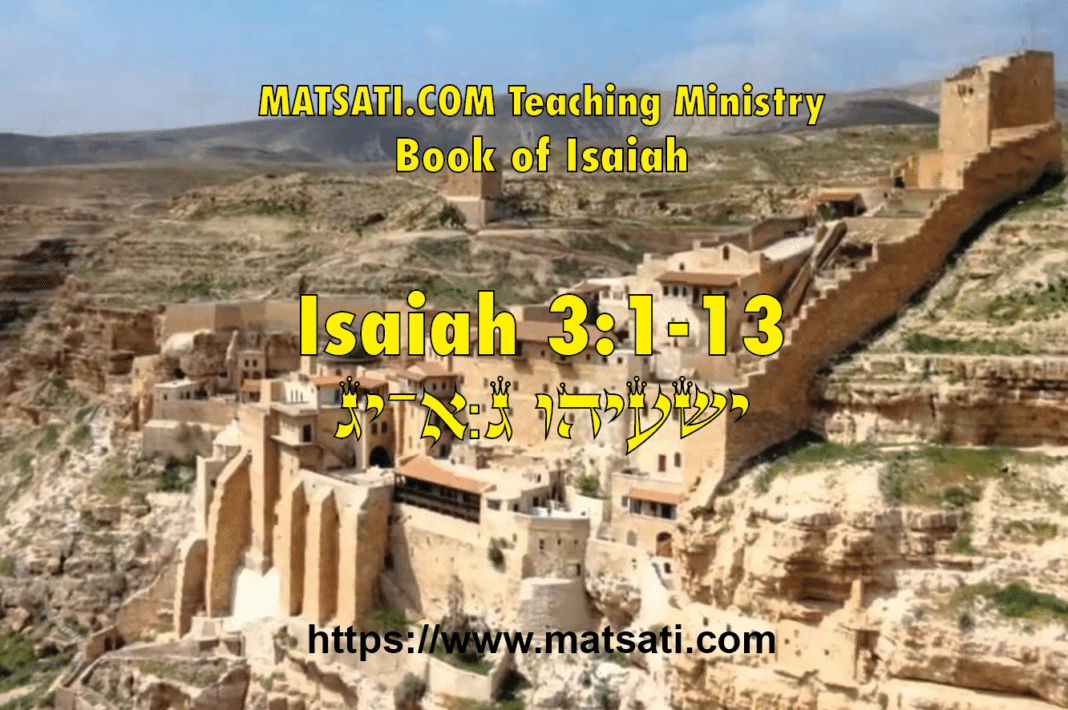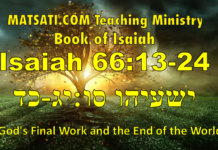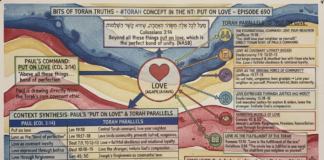Table of Contents
Introduction to Isaiah 3:1-13
Isaiah 3 goes on speaking about what the Lord will do to those who continue in their pride. Because of their refusal to serve the Lord, to walk in His ways, and to turn away from idols, they will be made ashamed, and will serve people who are ruthless and will suffer great loss. Because of their lack of hospitality, their pride, their murders, and their idolatry, the promise according to Isaiah 2:1-5 will not be realized. Isaiah makes it clear what is the end result of pride in various places throughout the book of Isaiah (see Isaiah 1:30-31, 5:1-7, 14:9-20, 14:34-35, 44:12-20, 44:47, 55:12-13, 63:1-6). As we will see, Isaiah 3 describes further judgment upon Judah and Jerusalem due to her sins. Northern Israel had been consumed by Assyria, and Isaiah is warning Judah and Jerusalem the same fate is theirs if they do not humbly seek the Lord God of Israel. Isaiah 3 opens saying the following:
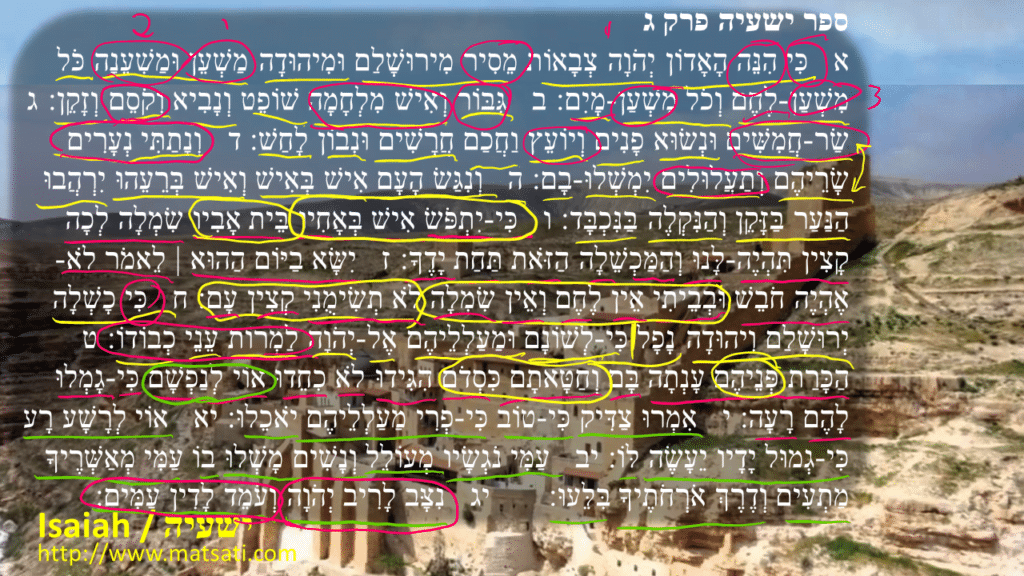
ספר ישעיה פרק ג
א כִּי֩ הִנֵּ֨ה הָאָד֜וֹן יְהוָ֣ה צְבָא֗וֹת מֵסִ֤יר מִירוּשָׁלִַ֙ם֙ וּמִ֣יהוּדָ֔ה מַשְׁעֵ֖ן וּמַשְׁעֵנָ֑ה כֹּ֚ל מִשְׁעַן־לֶ֔חֶם וְכֹ֖ל מִשְׁעַן־מָֽיִם׃
Isaiah 3:1 states, “For, behold, the Lord, the Lord of hosts, (כִּי֩ הִנֵּ֨ה הָאָד֜וֹן יְהוָ֣ה צְבָא֗וֹת) Doth take away from Jerusalem and from Judah the stay and the staff, (מֵסִ֤יר מִירוּשָׁלִַ֙ם֙ וּמִ֣יהוּדָ֔ה מַשְׁעֵ֖ן וּמַשְׁעֵנָ֑ה) The whole stay of bread, and the whole stay of water, (כֹּ֚ל מִשְׁעַן־לֶ֔חֶם וְכֹ֖ל מִשְׁעַן־מָֽיִם).” Isaiah opens chapter 3 with a declaration saying כִּי֩ הִנֵּ֨ה הָאָד֜וֹן יְהוָ֣ה צְבָא֗וֹת “For, behold, the Lord, the Lord of hosts.” The phrase יְהוָ֣ה צְבָא֗וֹת occurs more than 246X in the Tanakh. This opening phrase sets the stage for the people to recognize who it is that is speaking to them. We also note how כִּי֩ may function to connect different texts or modes of thought together in the Hebrew language. Its placement here reveals how Isaiah is linking the previous text to the present one. This is a testimony to how the chapter:verse numbering scheme is a much later phenomenon as the text should be considered a compositional whole. Note that this theme of not trusting in man therefore continues from the previous chapters. We note what is being portrayed here by the opening phrase, כִּי֩ הִנֵּ֨ה הָאָד֜וֹן יְהוָ֣ה צְבָא֗וֹת is that it is the Lord God Almighty who the people are facing, and not simply the Asyrian army. John Oswalt claims that the word הנה “behold” in prophetic speech typically introduces a threat. However, when we study its usage in the Torah, occurring 100X from a prophetic sense this can introduce a blessing, or an interval of time as referring to the present, the past, or the future. It is the Lord God Almighty whom the people face. The word מֵסִ֤יר is from the root סור meaning “change direction, turn aside.” The prophet is speaking of God turning aside מִירוּשָׁלִַ֙ם֙ וּמִ֣יהוּדָ֔ה “from Jerusalem and from Judah” מַשְׁעֵ֖ן וּמַשְׁעֵנָ֑ה. Note here that both of these words are a hapax legomenon. The word מַשְׁעֵ֖ן means “to support one’s self” which is why the KJV translated this word as “stay” and וּמַשְׁעֵנָ֑ה is from the same root word mashen (משען) where the KJV translates as “staff.” Notice how many times this root word is used in Isaiah 3:1, כִּי֩ הִנֵּ֨ה הָאָד֜וֹן יְהוָ֣ה צְבָא֗וֹת מֵסִ֤יר מִירוּשָׁלִַ֙ם֙ וּמִ֣יהוּדָ֔ה מַשְׁעֵ֖ן וּמַשְׁעֵנָ֑ה כֹּ֚ל מִשְׁעַן־לֶ֔חֶם וְכֹ֖ל מִשְׁעַן־מָֽיִם, occurring four times. This is why the KJV translates this as “a stay of bread” (מִשְׁעַן־לֶ֔חֶם) and a stay of water (מִשְׁעַן־מָֽיִם). Bread and water which support, or supply their nourishment. The words bread (לֶ֔חֶם) and water (מָֽיִם) draw in so many things from a Torah perspective. The bread which comes down from heaven in the sense of God sustaining the people, God alone being their “stay,” it was God who sustained and kept the people alive. (see Shemot / Exodus 16) The manna (in Hebrew, מן) was the miraculous edible substance that fell each day from heaven during the 40-year period between the Exodus and the promised land providing Israel with sustenance throughout their travels in the desert. The water reminds us of the various times God provided water for the peoples according to the Torah. When we read the NT, we read according to John 6:27, “Do not work for the food that spoils [or perishes], but for food that endures to eternal life, which the Son of Man will give you. On him God the Father has placed his seal of approval.” (NIV) This chapter follows Yeshua feeding the 5,000. Note how Yeshua explains that we are not to work for food that perishes, but that which endures to eternal life. We note the Torah teaches according to Devarim / Deuteronomy 8:18 it is the Lord God who gives us power (ability) to work. Yeshua is not advocating that we should not work, but that we are to seek the things which are eternal. We trust in God, because it is Him who supplies our needs. Just as Isaiah is saying that it isn’t against men that Judah and Jerusalem are confronting, they are confronting God Himself. The reason they are facing God as an opponent is due to their unrepentant sin. The Lord God doesn’t just supply our needs, He also removes our enemies. Here the phrase מִשְׁעַן־לֶ֔חֶם draws in the Torah context by saying that we are not just to work for food, but realize that the Lord God Almighty can also be at work with us, working in our lives, in our hearts, and in the lives of our enemies. When we become a light to the nations, this becomes ever more so apparent! Our goal in life should not be to simply earn money. Money in and of itself can become an idol as we had previously discussed. According to John 6, the people ask “What must we do to do the work of God?” (John 6:28 NIV) Note how this is the hunger that lies at the bottom of every heart. Everyone wants power to a greater or lesser extent. We want these things, but we also have the tendency to want them on our own terms, and not on God’s terms. What these things are teaching us is that if we don’t currently have a hunger and fire for God we need to get that hunger and it comes by studying God’s word and seeking His presence in our lives! First we are to be men and women of faith. We need a real relationship with God and stand for what is true, righteous, holy, and just. This is what Isaiah is explaining to the people of Judah and Jerusalem. What the prophet is saying here in Isaiah 3:1 is that we are to trust in God, or He will move in such a way as to cause us to trust in Him. This is what the Hebrew text reveals to us saying, מֵסִ֤יר מִירוּשָׁלִַ֙ם֙ וּמִ֣יהוּדָ֔ה מַשְׁעֵ֖ן וּמַשְׁעֵנָ֑ה כֹּ֚ל מִשְׁעַן־לֶ֔חֶם וְכֹ֖ל מִשְׁעַן־מָֽיִם “turning from Jerusalem and Judah the stay of food (bread) and the stay of water.” Yeshua responds to the people saying that “The work of God is this: to believe in the one whom he has sent.” (John 6:29 הֵשִׁיב יֵשׁוּעַ וְאָמַר לָהֶם׃ ״זֶהוּ פֹּעַל הָאֱלֹהִים –– שֶׁתַּאֲמִינוּ בָּזֶה אֲשֶׁר הוּא שָׁלַח.״) Yeshua says ״זֶהוּ פֹּעַל הָאֱלֹהִים –– שֶׁתַּאֲמִינוּ בָּזֶה אֲשֶׁר הוּא שָׁלַח “this is the work of God, that we believe (have faith) in the one in whom God sent.” We note Isaiah’s words taken within this context is that the people from Jerusalem and Judah were also to believe in the one whom God had sent, His Mashiakh. They are to believe in Isaiah’s prophetic words, who calls the people back to God and His Torah! What these things are explaining to us is that no man can do God’s work, it is only the Lord God Almighty in heaven who can do God’s work. These things again show us how we need the Lord to live our lives for Him! John Oswalt claims saying “The specification of bread and water seems out of place to many commentators in that all the succeeding references are to support derived from leaders.” (Oswalt, J. N. (1986). The Book of Isaiah, Chapters 1–39 (pp. 131–132)) The point is when we take Isaiah from a Torah perspective, the references to bread and water become very clear! This certainly is not out of place! These things speak to the need to trust in God, that He sustains us, that He has sent His Mashiakh Yeshua the true bread that comes down from heaven so that we can walk in his footsteps and bear the testimony of God. Isaiah stated that one day Judah and Jerusalem would experience physical deprivation as the Lord is calling the people back to Him! If they would only repent!
ספר ישעיה פרק ג
ב גִּבּ֖וֹר וְאִ֣ישׁ מִלְחָמָ֑ה שׁוֹפֵ֥ט וְנָבִ֖יא וְקֹסֵ֥ם וְזָקֵֽן׃ ג שַׂר־חֲמִשִּׁ֖ים וּנְשׂ֣וּא פָנִ֑ים וְיוֹעֵ֛ץ וַחֲכַ֥ם חֲרָשִׁ֖ים וּנְב֥וֹן לָֽחַשׁ׃
Isaiah 3:2 states, “The mighty man, (גִּבּ֖וֹר) and the man of War, (וְאִ֣ישׁ מִלְחָמָ֑ה) The judge, (שׁוֹפֵ֥ט) and the prophet, (וְנָבִ֖יא) and the prudent, and the ancient, (וְקֹסֵ֥ם וְזָקֵֽן).” Isaiah 3:3 “The captain of fifty, (שַׂר־חֲמִשִּׁ֖ים) and the honourable man, (וּנְשׂ֣וּא פָנִ֑ים) And the counselor, (וְיוֹעֵ֛ץ) and the cunning artificer, (וַחֲכַ֥ם חֲרָשִׁ֖ים) and the eloquent orator. (וּנְב֥וֹן לָֽחַשׁ)” Notice how this verse connects to Isaiah 3:1, מֵסִ֤יר מִירוּשָׁלִַ֙ם֙ וּמִ֣יהוּדָ֔ה מַשְׁעֵ֖ן וּמַשְׁעֵנָ֑ה כֹּ֚ל מִשְׁעַן־לֶ֔חֶם וְכֹ֖ל מִשְׁעַן־מָֽיִם “take away from Jerusalem and from Judah the stay and the staff, The whole stay of bread, and the whole stay of water.” Here in 3:2-3, the Lord says that He will take away the great men (גִּבּ֖וֹר) and the military man (וְאִ֣ישׁ מִלְחָמָ֑ה) where great physical strength will not be able to stand before a mighty and powerful God. And Isaiah’s prophetic message isn’t just to the mighty, the Lord God Almighty is also speaking to the judge (שׁוֹפֵ֥ט), the prophet (וְנָבִ֖יא), the prudent (וְקֹסֵ֥ם, deviner) and the ancient (וְזָקֵֽן, elder or old man). He says that the Lord will remove all of these people. This is exactly what happened as Assyria and Babylon conquered a land. (2 Kings 24:14) We note from a historical perspective, it was these types of people who were deported from Israel to a foreign land. The land was left with those who would be compliant, who gave of themselves without resistance to the foreign powers that were placed over them. Note in verse 3,states “The captain of fifty, (שַׂר־חֲמִשִּׁ֖ים) and the honorable man, (וּנְשׂ֣וּא פָנִ֑ים) And the counselor, (וְיוֹעֵ֛ץ) and the cunning artificer, (וַחֲכַ֥ם חֲרָשִׁ֖ים magician, hapax legomenon) and the eloquent orator. (וּנְב֥וֹן לָֽחַשׁ)” These are the people who could or would give advice and guidance to the people. These are those who would form a rebellion, or more appropriately lead the people back to faith in the one true God. By removing these people the Lord God was forcing them to trust and rely upon Him alone. We note even in Ezekiel 14 the people sought the Lord but yet continued to keep hold of the idols in their hearts. Note that the king of Israel is not mentioned, but only the leaders and powerful warriors.
ספר ישעיה פרק ג
ד וְנָתַתִּ֥י נְעָרִ֖ים שָׂרֵיהֶ֑ם וְתַעֲלוּלִ֖ים יִמְשְׁלוּ־בָֽם׃ ה וְנִגַּ֣שׂ הָעָ֔ם אִ֥ישׁ בְּאִ֖ישׁ וְאִ֣ישׁ בְּרֵעֵ֑הוּ יִרְהֲב֗וּ הַנַּ֙עַר֙ בַּזָּקֵ֔ן וְהַנִּקְלֶ֖ה בַּנִּכְבָּֽד׃
Isaiah 3:4 states, “And I will give children to be their princes, (וְנָתַתִּ֥י נְעָרִ֖ים שָׂרֵיהֶ֑ם) And babes shall rule over them. (וְתַעֲלוּלִ֖ים יִמְשְׁלוּ־בָֽם)” Isaiah 3:5 “And the people shall be oppressed, (וְנִגַּ֣שׂ הָעָ֔ם) every one by another, (אִ֥ישׁ בְּאִ֖ישׁ) and every one by his neighbour: (וְאִ֣ישׁ בְּרֵעֵ֑הוּ) The child shall behave himself proudly against the ancient, (יִרְהֲב֗וּ הַנַּ֙עַר֙ בַּזָּקֵ֔ן) And the base against the honourable. (וְהַנִּקְלֶ֖ה בַּנִּכְבָּֽד)” It is interesting here how the Lord speaking through Isaiah states that he will set youth (נְעָרִ֖ים ) to rule over the people, even children (וְתַעֲלוּלִ֖ים). What is interesting is how this draws in the idea of young inexperienced people being established as leaders. If we think about this, we all want our children to become leaders. Generally speaking, we want our children to grow to be courageous, passionate and authentic. We want their actions to inspire other people to be their best, to get more out of life than they ever thought possible. As parents we strive to guide our children on the path to leadership. In order to do this, we need to model and teach the skills that will equip them to lead themselves and others in this world, or we can allow them to fall victim to the kind of thinking that makes them slaves to the status quo. These are the reasons we are studying God’s word, we are modifying our way of thinking to shape our minds to be conformed to God’s ways so that we do not become slaves to the status quo, to the thinking of this world, to the nonsensical liberal ideologies that are destroying our nation. We also want our children to be critical thinkers, to be able to think outside of the box. Today we see dangerous ideologies being taught to our children in the classroom (i.e. critical race theory, and the nonsensical reasoning of what is called “equity” / “equality.” Note equality is not defined as what one would naturally believe.). Because of these horrible ideologies and parents not raising their children to know the Lord, the classroom has become chaotic and undisciplined as children defy authority. These behaviors come out of our culture, and what children are watching on television, learning at home, and in the classroom. It is these types of children that Isaiah is speaking of, as being put in place to rule over the people. Children especially in the inner cities become troubled and dangerous. The interesting thing is that biblical prophecy has long ago predicted these things, and we are seeing these behaviors drawing out these ancient warnings today, such as what we are reading here in Isaiah. The people themselves were rebellious, they refused to hear the Word of the Lord, and so they were delivered into the hands of these types of people. We note how the previous text is connected to this text here, which speaks of the end of the age. Based upon this context, Isaiah delivered to the rebellious children of Israel prophecies that have clear implications for generations living at the end of the age. The Lord God Almighty warned saying, “I will give children to be their princes, and babes shall rule over them… the child will be insolent [rude, disrespectful, defiant] toward the elder, and the base toward the honorable… as for My people, children are their oppressors” (Isaiah 3:4-5, 3:12). We also note what Jeremiah wrote, how the children would not receive correction and have forgotten God (Jeremiah 2:30, 2:32). Ezekiel also wrote about children who “rebelled against Me” and “did not walk in My statutes.” (see Ezekiel 20:21) Remember that prophecy has both a present or near present fulfillment, as well as a future expectation. These prophecies obviously had an initial fulfillment in ancient times. The fulfillment of these things are also occurring today with the news reporting the growing plague of defiant, joyless and selfish children.
Long ago, King Solomon wrote, “Train up a child in the way he should go” (Mishley / Proverbs 22:6). This instruction of God we are told is God’s Torah (Devarim / Deuteronomy 4:1-10, 6:1-9). Note also how children are to be given supervision, correction and encouragement (Mishley / Proverbs 29:15, 17, Ephesians 6:1-4). Solomon also warned, “He who spares his rod hates his son, but he who loves him disciplines him promptly.” (Mishley / Proverbs 13:24) These simple but fundamental principles have been ridiculed and rejected by modern “experts” who are developing total nonsense teachings for schools such as critical race theory. Because of these things, we are reaping the tragic results! Yet all this was foretold by the prophets of what would happen for those who reject God and His Holy and Righteous ways! Isaiah warned, “Those who lead you cause you to err, and destroy the way of your paths.” (Isaiah 3:12, 9:16) Hosea prophesied that “they sow the wind, and reap the whirlwind” and he warns parents saying, “Because you have forgotten the Torah of your God, I also will forget your children… [you] have begotten pagan / strange children” (Hosea 8:7, see also Hosea 4:6, 5:7). The joyless, vulgar, defiant, predatory, pleasure-seeking, out-of-control children who recognize no higher authority than their own desires are the products of a misguided age of peoples. The prophet Isaiah among others describes that this would occur in the last days just before the return of Yeshua according to Paul in 2 Timothy 3:1-4. This is Isaiah’s call, we need to wake up because these prophecies are coming alive today! So these things reveal to us that when people commit themselves, when they trust without critical thought, the result is disaster. Isaiah says that Judah and Jerusalem will go from the mighty man to the spoilt, unruly, selfish child. Another idea may be that the leaders who are grown adults will behave as children. This happens when a nation allows their rulers to believe they rule in their own right without consequences. Can we not see this taking place today? Because of these things, governments and nations begin to collapse as authority is rejected. We know that when the rule of law is removed (the police) crime and corruption prosper. Notice how the natural result of a people who give their lives to the Yetzer Hara (evil inclination) allow these things to run freely, and without restraint or thought of the consequences. The end result is corruption, crime, anarchy, and then each man and his neighbor will devour each other and nothing will be left. These again are the consequences of a nation that has left God, that has walked away from His Holy Word!
ספר ישעיה פרק ג
ו כִּֽי־יִתְפֹּ֨שׂ אִ֤ישׁ בְּאָחִיו֙ בֵּ֣ית אָבִ֔יו שִׂמְלָ֣ה לְכָ֔ה קָצִ֖ין תִּֽהְיֶה־לָּ֑נוּ וְהַמַּכְשֵׁלָ֥ה הַזֹּ֖את תַּ֥חַת יָדֶֽךָ׃ ז יִשָּׂא֩ בַיּ֨וֹם הַה֤וּא ׀ לֵאמֹר֙ לֹא־אֶהְיֶ֣ה חֹבֵ֔שׁ וּבְבֵיתִ֕י אֵ֥ין לֶ֖חֶם וְאֵ֣ין שִׂמְלָ֑ה לֹ֥א תְשִׂימֻ֖נִי קְצִ֥ין עָֽם׃
Isaiah 3:6 states, “When a man shall take hold of his brother (כִּֽי־יִתְפֹּ֨שׂ אִ֤ישׁ בְּאָחִיו֙) of the house of his father, (בֵּ֣ית אָבִ֔יו) saying, Thou hast clothing, (שִׂמְלָ֣ה לְכָ֔ה) be thou our ruler, (קָצִ֖ין תִּֽהְיֶה־לָּ֑נוּ) And let this ruin be under thy hand: (וְהַמַּכְשֵׁלָ֥ה הַזֹּ֖את תַּ֥חַת יָדֶֽךָ)” Isaiah 3:7 “In that day shall he swear, (יִשָּׂא֩ בַיּ֨וֹם הַה֤וּא) saying, I will not be an healer; (לֵאמֹר֙ לֹא־אֶהְיֶ֣ה חֹבֵ֔שׁ) For in my house is neither bread nor clothing: (וּבְבֵיתִ֕י אֵ֥ין לֶ֖חֶם וְאֵ֣ין שִׂמְלָ֑ה) Make me not a ruler of the people. (לֹ֥א תְשִׂימֻ֖נִי קְצִ֥ין עָֽם)” Note how this is written, כִּֽי־יִתְפֹּ֨שׂ אִ֤ישׁ בְּאָחִיו֙ “When a man shall take hold of his brother” this suggests that there will be a time of not distinguishing between men and/or skill set or experience. Judah will be ruled by random persons. There will be a famine of leadership, and there will be poverty and lack of food וּבְבֵיתִ֕י אֵ֥ין לֶ֖חֶם וְאֵ֣ין שִׂמְלָ֑ה “For in my house is neither bread nor clothing.” The word שִׂמְלָ֑ה mans “outer garment, mantle, clothing” and can refer to something that one places over his or her cloths. This sounds like a piece of clothing that distinguishes one from another as being in a place of importance of having some sort of achievement. This reminds of the graduation stage when one places the graduation garments on before receiving a diploma. This random person that is chosen to be a leader will say, לֹ֥א תְשִׂימֻ֖נִי קְצִ֥ין עָֽם “Make me not a ruler of the people.” There is neither will nor desire for this person to enter into a place of responsibility and leadership. Could the reason be that the land is utterly destroyed and so there is no desire to rule? The point may be that as a leader, and due to the destruction that has come upon the people from God, he could neither feed nor cloth the people. This is a time of great humbling, the former pride is gone, and the former glory is gone as well, all of the people have been humbled, including the land.
ספר ישעיה פרק ג
ח כִּ֤י כָשְׁלָה֙ יְר֣וּשָׁלִַ֔ם וִיהוּדָ֖ה נָפָ֑ל כִּֽי־לְשׁוֹנָ֤ם וּמַֽעַלְלֵיהֶם֙ אֶל־יְהוָ֔ה לַמְר֖וֹת עֵנֵ֥י כְבוֹדֽוֹ׃
Isaiah 3:8 states, “For Jerusalem is ruined, and Judah is fallen: (כִּ֤י כָשְׁלָה֙ יְר֣וּשָׁלִַ֔ם וִיהוּדָ֖ה נָפָ֑ל) Because their tongue and their doings are against the Lord, (כִּֽי־לְשׁוֹנָ֤ם וּמַֽעַלְלֵיהֶם֙ אֶל־יְהוָ֔ה) To provoke the eyes of his glory. (לַמְר֖וֹת עֵנֵ֥י כְבוֹדֽוֹ)” Here Isaiah says כִּ֤י כָשְׁלָה֙ יְר֣וּשָׁלִַ֔ם וִיהוּדָ֖ה נָפָ֑ל using the word כָשְׁלָה֙ meaning “stumble, stagger” describing the state of the holy city. The KJV translates this as “ruined” whereas the ESV, NASB, LEB, CSB, NIV, NLT, NKJV, all translate as “Stumbled.” The idea of stumbling is a description of humiliation, of falling and all have seen. Isaiah 3:8 begins with the word כִּ֤י “for” which functions as a coordinating conjunction, connecting the previous text to this present verse. This stumbling and falling is due to their rebellion, which consists of כִּֽי־לְשׁוֹנָ֤ם וּמַֽעַלְלֵיהֶם֙ אֶל־יְהוָ֔ה “Because their tongue and their doings are against the Lord.” This rebellion is not just a function of one’s actions, but of the heart as the text states the words of their tongue. Notice what we are taught about these things according to the scriptures:
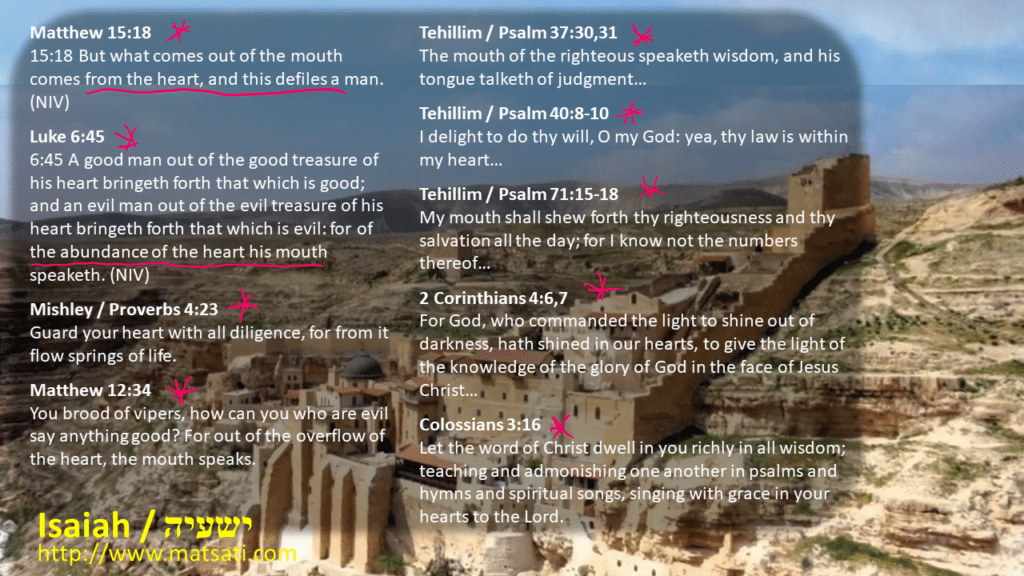
Matthew 15:18
15:18 But what comes out of the mouth comes from the heart, and this defiles a man. (NIV)
Luke 6:45
6:45 A good man out of the good treasure of his heart bringeth forth that which is good; and an evil man out of the evil treasure of his heart bringeth forth that which is evil: for of the abundance of the heart his mouth speaketh. (NIV)
Mishley / Proverbs 4:23
Guard your heart with all diligence, for from it flow springs of life.
Matthew 12:34
You brood of vipers, how can you who are evil say anything good? For out of the overflow of the heart, the mouth speaks.
Tehillim / Psalm 37:30,31
The mouth of the righteous speaketh wisdom, and his tongue talketh of judgment…
Tehillim / Psalm 40:8-10
I delight to do thy will, O my God: yea, thy law is within my heart…
Tehillim / Psalm 71:15-18
My mouth shall shew forth thy righteousness and thy salvation all the day; for I know not the numbers thereof…
2 Corinthians 4:6,7
For God, who commanded the light to shine out of darkness, hath shined in our hearts, to give the light of the knowledge of the glory of God in the face of Jesus Christ…
Colossians 3:16
Let the word of Christ dwell in you richly in all wisdom; teaching and admonishing one another in psalms and hymns and spiritual songs, singing with grace in your hearts to the Lord.
Yeshua, Solomon, David, Paul, all of these men spoke of these things in regards to the words or the mouth and our heart before God. Note something about the Hebrew text, the scriptures do not distinguish between the head and the heart as the word לבב can refer to both the heart and one’s thoughts. The Hebrew language combines the elements of the mind, the will, and the emotions together with the language of an organ that can feel, think, which leads to our actions. These things speak to our bodies and our thought life being a compositional whole, which draws in the idea that we cannot simply think however we like without it affecting our relationship with God and the way we live. This is why we are told there was a need for the Lord God to send his Messiah Yeshua, to not just lead us in walking in his footsteps, but that by faith we receive the spirit of God (John 14) and it is the Holy Spirit of God that transforms us from the inside. And what happens on the inside causes us to live our faith! So when Isaiah states כִּ֤י כָשְׁלָה֙ יְר֣וּשָׁלִַ֔ם וִיהוּדָ֖ה נָפָ֑ל “For Jerusalem is ruined, and Judah is fallen,” these words speak to something much deeper, a problem that speaks to the heart as the source of moral and spiritual sin. This is why the people lived out their sin directly before God in defiance to Him (כִּֽי־לְשׁוֹנָ֤ם וּמַֽעַלְלֵיהֶם֙ אֶל־יְהוָ֔ה) as Isaiah describes it, לַמְר֖וֹת עֵנֵ֥י כְבוֹדֽוֹ “To provoke the eyes of his glory.” Here there is an anthropomorphism that is ascribed to the Shekinah glory of God. This makes sense from a Torah perspective, in the way in which Isaiah describes this עֵנֵ֥י כְבוֹדֽוֹ “the eyes of His glory” when we consider one of the major Torah centric principles that is being taught according to Moshe. The Lord God desires to dwell in the midst of His people. The presence of God is manifested many times in the Scriptures being described as the glory of God, the cloud, the Shekhinah. The glory of God therefore is ever present, and bears witness to what we do, how we live, what we say, and even to what we think in our hearts as the Spirit of God dwells inside of us! This language עֵנֵ֥י כְבוֹדֽוֹ captures the essence of the all knowing God, as seeing everything, as his glory being manifest in the midst of those who are faithful.
ספר ישעיה פרק ג
ט הַכָּרַ֤ת פְּנֵיהֶם֙ עָ֣נְתָה בָּ֔ם וְחַטָּאתָ֛ם כִּסְדֹ֥ם הִגִּ֖ידוּ לֹ֣א כִחֵ֑דוּ א֣וֹי לְנַפְשָׁ֔ם כִּֽי־גָמְל֥וּ לָהֶ֖ם רָעָֽה׃
Isaiah 3:9 states, “The face of their countenance doth witness against them; (הַכָּרַ֤ת פְּנֵיהֶם֙ עָ֣נְתָה בָּ֔ם) And they declare their sin as Sodom, (וְחַטָּאתָ֛ם כִּסְדֹ֥ם) they hide it not. (הִגִּ֖ידוּ לֹ֣א כִחֵ֑דוּ) Woe unto their soul! for they have rewarded evil unto themselves. (א֣וֹי לְנַפְשָׁ֔ם כִּֽי־גָמְל֥וּ לָהֶ֖ם רָעָֽה)” This is interesting as Isaiah is saying that their faces are giving away what they think (הַכָּרַ֤ת פְּנֵיהֶם֙ עָ֣נְתָה בָּ֔ם). This phrase פְּנֵיהֶם֙ translated as “their face” is used in a variety of ways according to the Torah and elsewhere.
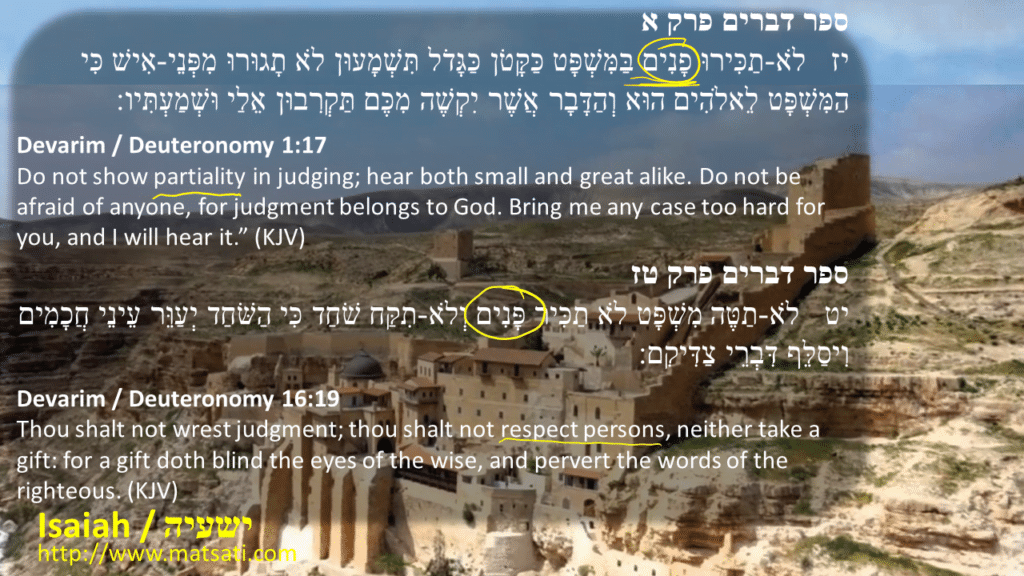
ספר דברים פרק א
יז לֹא-תַכִּירוּ פָנִים בַּמִּשְׁפָּט כַּקָּטֹן כַּגָּדֹל תִּשְׁמָעוּן לֹא תָגוּרוּ מִפְּנֵי-אִישׁ כִּי הַמִּשְׁפָּט לֵאלֹהִים הוּא וְהַדָּבָר אֲשֶׁר יִקְשֶׁה מִכֶּם תַּקְרִבוּן אֵלַי וּשְׁמַעְתִּיו:
Devarim / Deuteronomy 1:17
Do not show partiality in judging; hear both small and great alike. Do not be afraid of anyone, for judgment belongs to God. Bring me any case too hard for you, and I will hear it.” (KJV)
ספר דברים פרק טז
יט לֹא-תַטֶּה מִשְׁפָּט לֹא תַכִּיר פָּנִים וְלֹא-תִקַּח שֹׁחַד כִּי הַשֹּׁחַד יְעַוֵּר עֵינֵי חֲכָמִים וִיסַלֵּף דִּבְרֵי צַדִּיקִם:
Devarim / Deuteronomy 16:19
Thou shalt not wrest judgment; thou shalt not respect persons, neither take a gift: for a gift doth blind the eyes of the wise, and pervert the words of the righteous. (KJV)
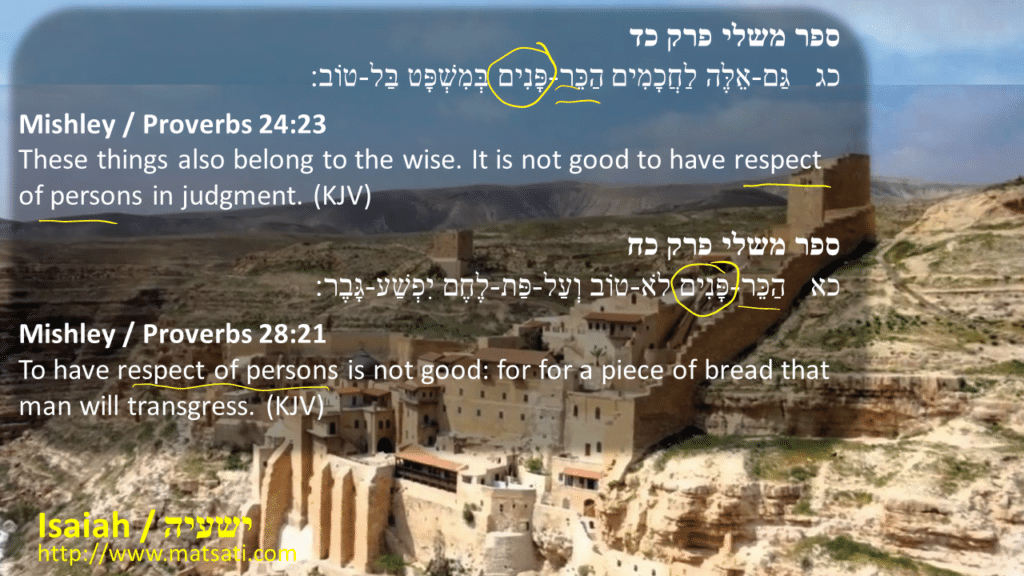
ספר משלי פרק כד
כג גַּם-אֵלֶּה לַחֲכָמִים הַכֵּר-פָּנִים בְּמִשְׁפָּט בַּל-טוֹב:
Mishley / Proverbs 24:23
These things also belong to the wise. It is not good to have respect of persons in judgment. (KJV)
ספר משלי פרק כח
כא הַכֵּר-פָּנִים לֹא-טוֹב וְעַל-פַּת-לֶחֶם יִפְשַׁע-גָּבֶר:
Mishley / Proverbs 28:21
To have respect of persons is not good: for for a piece of bread that man will transgress. (KJV)
Note how in Devarim / Deuteronomy 1:17 פָנִים is translated as “partiality” in judging, as a person in Devarim / Deuteronomy 16:19 and Mishley / Proverbs 24:23 and 28:21. The face represents one’s presence or person. This is how it is used elsewhere as a reference to one’s own self according to Isaiah 47:14, Bamidbar / Numbers 30:3, Job 9:21, and Ezekiel 14:14 and 14:20. So the idea is “The face of their countenance doth witness against them; (הַכָּרַ֤ת פְּנֵיהֶם֙ עָ֣נְתָה בָּ֔ם)” means that they are a testimony to themselves, their sins are so extreme that “they declare their sin as Sodom, (וְחַטָּאתָ֛ם כִּסְדֹ֥ם) they hide it not (הִגִּ֖ידוּ לֹ֣א כִחֵ֑דוּ).” It is interesting how fruit in many places are analogized to the works of one’s hands, or the way one lives his or her life for the Lord. Notice what happens when one makes sin their way of life, Isaiah describes this as “Woe unto their soul! for they have rewarded evil unto themselves. (א֣וֹי לְנַפְשָׁ֔ם כִּֽי־גָמְל֥וּ לָהֶ֖ם רָעָֽה)” The reward for living a life of unrepentant sin is evil unto one’s self.
ספר ישעיה פרק ג
י אִמְר֥וּ צַדִּ֖יק כִּי־ט֑וֹב כִּֽי־פְרִ֥י מַעַלְלֵיהֶ֖ם יֹאכֵֽלוּ׃ יא א֖וֹי לְרָשָׁ֣ע רָ֑ע כִּֽי־גְמ֥וּל יָדָ֖יו יֵעָ֥שֶׂה לּֽוֹ׃ יב עַמִּי֙ נֹגְשָׂ֣יו מְעוֹלֵ֔ל וְנָשִׁ֖ים מָ֣שְׁלוּ ב֑וֹ עַמִּי֙ מְאַשְּׁרֶ֣יךָ מַתְעִ֔ים וְדֶ֥רֶךְ אֹֽרְחֹתֶ֖יךָ בִּלֵּֽעוּ׃ יג נִצָּ֥ב לָרִ֖יב יְהוָ֑ה וְעֹמֵ֖ד לָדִ֥ין עַמִּֽים׃
Isaiah 3:10 states, “Say ye to the righteous, (אִמְר֥וּ צַדִּ֖יק) that it shall be well with him: (כִּי־ט֑וֹב) For they shall eat the fruit of their doings. (כִּֽי־פְרִ֥י מַעַלְלֵיהֶ֖ם יֹאכֵֽלוּ)” Isaiah 3:11 “Woe unto the wicked! it shall be ill with him: (א֖וֹי לְרָשָׁ֣ע רָ֑ע) For the reward of his hands shall be given him. (כִּֽי־גְמ֥וּל יָדָ֖יו יֵעָ֥שֶׂה לּֽוֹ)” Isaiah 3:12 “As for my people, children are their oppressors, (עַמִּי֙ נֹגְשָׂ֣יו מְעוֹלֵ֔ל) And women rule over them. (וְנָשִׁ֖ים מָ֣שְׁלוּ ב֑וֹ) O my people, they which lead thee cause thee to err, (עַמִּי֙ מְאַשְּׁרֶ֣יךָ מַתְעִ֔ים) And destroy the way of thy paths. (וְדֶ֥רֶךְ אֹֽרְחֹתֶ֖יךָ בִּלֵּֽעוּ)” Isaiah 3:13 “The Lord standeth up to plead, (נִצָּ֥ב לָרִ֖יב יְהוָ֑ה) And standeth to judge the people. (וְעֹמֵ֖ד לָדִ֥ין עַמִּֽים)” We note how Isaiah 3:10 follows from 3:9 The reward for living a life of unrepentant sin is evil unto one’s self. Isaiah follows with the righteous eating the fruit of their works. Something to note though is that the wicked do not always reap the reward of their evil deeds. The prophet Jeremiah struggled with this very issue when he asked the Lord, “Why does the way of the wicked prosper? Why do all the faithless live at ease? You have planted them, and they have taken root; they grow and bear fruit. You are always on their lips but far from their hearts” (Jeremiah 12:1-2). Job asked the very same thing, “Why do the wicked live on, growing old and increasing in power?” (Job 21:7). And expressed similar thoughts about the prosperity of the wicked, wondering if living righteously was worth the trouble (see Tehillim / Psalm 73:3, 73:13). The point of these things is that we are not and should not envy the wicked. Isaiah 3:11 puts everything into perspective, “Woe unto the wicked! it shall be ill with him: (א֖וֹי לְרָשָׁ֣ע רָ֑ע) For the reward of his hands shall be given him. (כִּֽי־גְמ֥וּל יָדָ֖יו יֵעָ֥שֶׂה לּֽוֹ)” These things will be true, and one day we will all stand to give account before God in heaven. Isaiah reiterates a Torah concept, saying that those who do right will experience good and those who do wrong will experience evil. These things are expressed according to the end of the book of Devarim / Deuteronomy. The point is that the Lord deals with His creation according to His Word and is therefore consistent in all of His ways. To live our lives for the Lord, seeking His Help through the indwelling of God’s Holy Spirit by faith in Yeshua, we will reap the reward of being given peace in all circumstances, and of the rewards that are promised in the Olam Haba (World to come).
We note something about Isaiah 3:12 which states, “As for my people, children are their oppressors, (עַמִּי֙ נֹגְשָׂ֣יו מְעוֹלֵ֔ל) And women rule over them. (וְנָשִׁ֖ים מָ֣שְׁלוּ ב֑וֹ) O my people, they which lead thee cause thee to err, (עַמִּי֙ מְאַשְּׁרֶ֣יךָ מַתְעִ֔ים) And destroy the way of thy paths. (וְדֶ֥רֶךְ אֹֽרְחֹתֶ֖יךָ בִּלֵּֽעוּ)” From the sense of this verse, children and women leading the people and causing them to error (מַתְעִ֔ים), the idea here is on being fit for public service. Isaiah is not necessarily placing a negative twist on women ruling in a public service position. When we read what Paul wrote according to 1 Timothy 2:12 “And I do not permit a woman to teach or to have authority over a man, but to be in silence” (KJV) when we consider the context, this is pertaining to spiritual leadership, as Paul uses the Torah as a basis for his instructions here from Bereshit / Genesis 3. Remember, when we look through the lenses of the Torah, all of scripture makes more sense! It is actually the incompetence in leadership in public service which is causing the people to stray from the path that God wants them on. Interestingly enough though, the role of the Mashiakh (anointed one of God) according to the Scriptures is that of a military leader, a sage (Tsadik), and a prophet like Moshe. The Messiah was also a man. We are also told according to 1 John 2:6 He who says he abides in Him ought himself also to walk just as He walked. (KJV) This teaches us that we are to follow Yeshua, to internalize His belief system, and align our vision with the vision and values that Yeshua taught us! This concept of a messianic redeemer is a lesson in leadership. The Torah, the Prophets, and the Writings all provide us with details on the role of the Messiah, where he is to be the one who transforms our lives. If we choose to walk in the footsteps of the Messiah, and seek God’s help in doing so, we will not stray from the path that God wants us on. As Yeshua always directs us to God our Father in heaven according to His holy Word, the Tanakh and the Apostolic Writings. It is interesting what Isaiah 3:13 states, “The Lord standeth up to plead, (נִצָּ֥ב לָרִ֖יב יְהוָ֑ה) And standeth to judge the people. (וְעֹמֵ֖ד לָדִ֥ין עַמִּֽים)” Here it appears that it is the Lord who stands up to plead, and the Lord is the one who judges as well. The word דִ֥ין means to “plead one’s cause, content, argue.” It almost sounds like the Lord is pleading on one’s behalf, which is in fact one of the principle roles of the Cohen as the Mashiakh of God! This understanding on the function of leaders is very important as leadership involves a higher calling, a responsibility before God, and a responsibility to the people. If the leaders are corrupt, history bears out that the people will also fall into corruption themselves. This is how Zechariah understood rulership. He calls the leaders people who shepherds who devour the flock (Zechariah 11:1-17). What all of these things are teaching us is that God is slow to anger, abounding in love. He is a compassionate God who gives certain blessings to all people (Matthew 5:45) and who desires all to be saved. His patience with the wicked is an opportunity for them to know him in His Messiah Yeshua as Peter wrote saying, “And remember, our Lord’s patience gives people time to be saved. This is what our beloved brother Paul also wrote to you with the wisdom God gave him” (2 Peter 3:15, NLT).
Rabbinic Commentary Isaiah 3:1-13
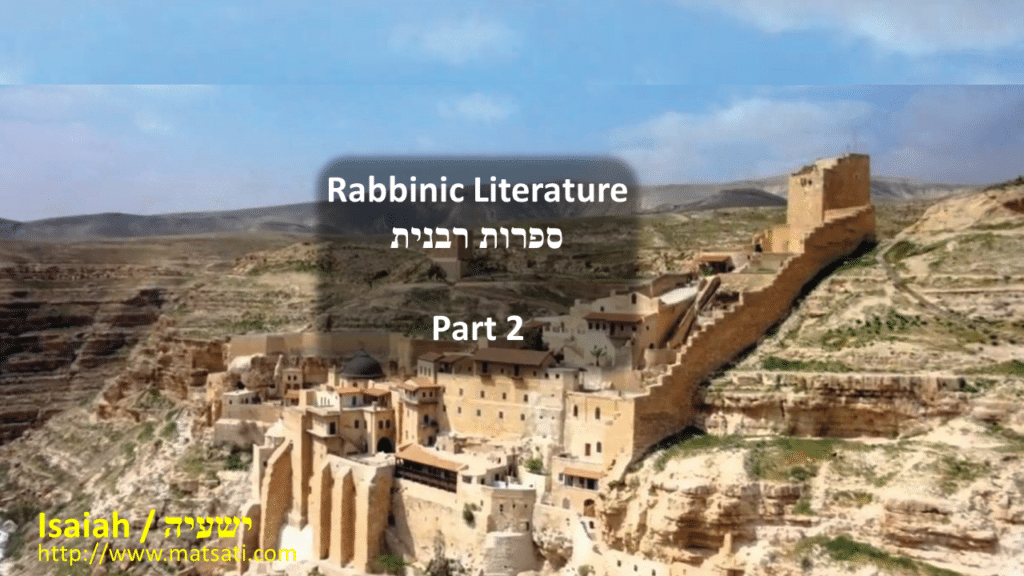
The Targum Jonathan translates Isaiah 3:1-13 in the following way:
תרגום יונתן בן עוזיאל אל ישעיה פרק ג:א-יג
אְרֵי הָא רִבֹון עָלְמָא יוי ”צְבָאֹות“ א מַעדֵי מִירוּשלַם וּמִיהוּדָה סָמֵיך וְסָעֵיד כָל סְמַך מֵיכַל וְכָל סְמַך מִשתֵי׃ ב גִיבָר וּגבַר עָבֵיד קְרָב דַיָין וְסָפַר וּמִשתְאֵיל וְסָב׃ ג רַב חַמשִין וּנסִיב אַפִין וּמָלֵך מֵילַך וְאָמַר וּמִשתְמַע וְחַכִים וְסִיב וְסוּכלְתָן בְעֵיצָא׃ ד וַאְמַנֵי יָנְקַיָא פַרנָסֵיהֹון וְחַלָשַיָא יִשלְטוּן בְהֹון׃ ה וְיִתגָרוּן עַמָא גְבַר בִגבַר וּגבַר בְחַברֵיה יִשלְטוּן עוּלֵימָא בְסָבָא וּדשִיט בִדיַקִיר׃ ו אְרֵי יֵיחֹוד גְבַר בַאְחוּהִי מִזַרעִית בֵית אְבוּהִי לְמֵימַר כְסוּ אִית לָך רָב תְהֵי עְלַנָא וּמַגבִיתָא הָדָא תְהֵי תְחֹות יְדָך׃ ז יָתִיב בְעִידָנָא הַהוּא לְמֵימַר לֵית אְנָא כָשַר לְמִהוֵי רֵיש וּבבֵיתִי לֵית מָא דאֵיכֹול וְלֵית מָא דְאַתכַסֵי לָא תְמַנֹונַנִי רָב עַל עַמָא׃ ח אְרֵי אִתְקִילוּ יָתְבֵי יְרוּשְלַם וַאְנָש יְהוּדָה גְלֹו אְרֵי מַמלַל פוּמְהֹון וַאְגַר עוּבָדֵיהֹון גְלַן קֳדָם יוי מַרגְזִין קֳדָם יְקָרֵיה׃ ט אִשתְמֹודְעוּת אַפֵיהֹון בְדִינָא אַסהֵיד בְהֹון וּחָטאֵיהֹון כִסדֹומָאֵי קָבְלִין לָא מָנְעִין וָי לְנַפשְהֹון אְרֵי גְרַמוּ דְתֵיתֵי לְהֹון בִשתָא׃ י אֵימַרוּ לְצַדִיקַיָא טוּבֵיכֹון אְרֵי פֵירֵי עוּבָדֵיהֹון יִשתַלְמוּן׃ יא וָי לְרַשִיעַיָא דְעֹובָדֵיהֹון בִישִין אְרֵי גִמלָא דִידֵיהֹון יִתָתַב לְהֹון׃ יב עַמִי דְסָרְכֹוהִי בְזָזוּהִי כִמעָלְלֵי כַרמָא וּכמָרֵי חֹובָא שְלִיטוּ בֵיה עַמִי מְשַבְחָך אַטעְיוּך וְאֹורַח שְבִילָך קַלקִילוּ׃ יג עְתִיד לִמדָן יוי וּמִתגְלֵי לְמַעְבַד פֹורעָנוּת דִין מִן עַמְמַיָא׃
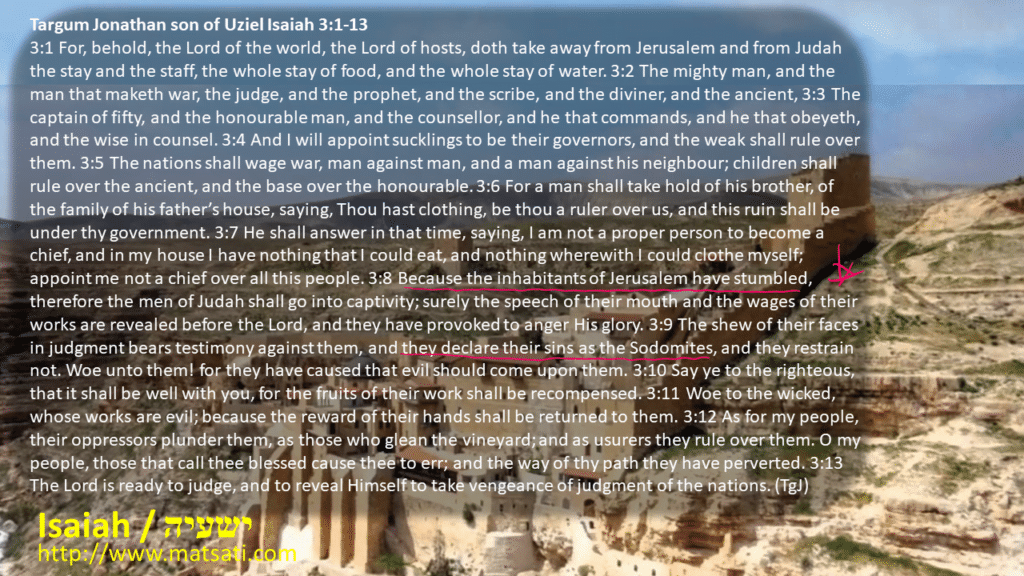
Targum Jonathan son of Uziel Isaiah 3:1-13
3:1 For, behold, the Lord of the world, the Lord of hosts, doth take away from Jerusalem and from Judah the stay and the staff, the whole stay of food, and the whole stay of water. 3:2 The mighty man, and the man that maketh war, the judge, and the prophet, and the scribe, and the diviner, and the ancient, 3:3 The captain of fifty, and the honourable man, and the counsellor, and he that commands, and he that obeyeth, and the wise in counsel. 3:4 And I will appoint sucklings to be their governors, and the weak shall rule over them. 3:5 The nations shall wage war, man against man, and a man against his neighbour; children shall rule over the ancient, and the base over the honourable. 3:6 For a man shall take hold of his brother, of the family of his father’s house, saying, Thou hast clothing, be thou a ruler over us, and this ruin shall be under thy government. 3:7 He shall answer in that time, saying, I am not a proper person to become a chief, and in my house I have nothing that I could eat, and nothing wherewith I could clothe myself; appoint me not a chief over all this people. 3:8 Because the inhabitants of Jerusalem have stumbled, therefore the men of Judah shall go into captivity; surely the speech of their mouth and the wages of their works are revealed before the Lord, and they have provoked to anger His glory. 3:9 The shew of their faces in judgment bears testimony against them, and they declare their sins as the Sodomites, and they restrain not. Woe unto them! for they have caused that evil should come upon them. 3:10 Say ye to the righteous, that it shall be well with you, for the fruits of their work shall be recompensed. 3:11 Woe to the wicked, whose works are evil; because the reward of their hands shall be returned to them. 3:12 As for my people, their oppressors plunder them, as those who glean the vineyard; and as usurers they rule over them. O my people, those that call thee blessed cause thee to err; and the way of thy path they have perverted. 3:13 The Lord is ready to judge, and to reveal Himself to take vengeance of judgment of the nations. (TgJ)
Targum Jonathan is a very close word for word translation of Isaiah from the Masoretic text in Isaiah 3:1-13. The first verse in chapter 3 states, אְרֵי הָא רִבֹון עָלְמָא יוי ”צְבָאֹות“ א מַעדֵי מִירוּשלַם וּמִיהוּדָה סָמֵיך וְסָעֵיד כָל סְמַך מֵיכַל וְכָל סְמַך מִשתֵי׃ 3:1 For, behold, the Lord of the world, the Lord of hosts, doth take away from Jerusalem and from Judah the stay and the staff, the whole stay of food, and the whole stay of water. (TgJ) Rashi points out this entire section of the scripture from Isaiah 3 is explained in the Talmud Bavli Tractate Chagigah 14a.
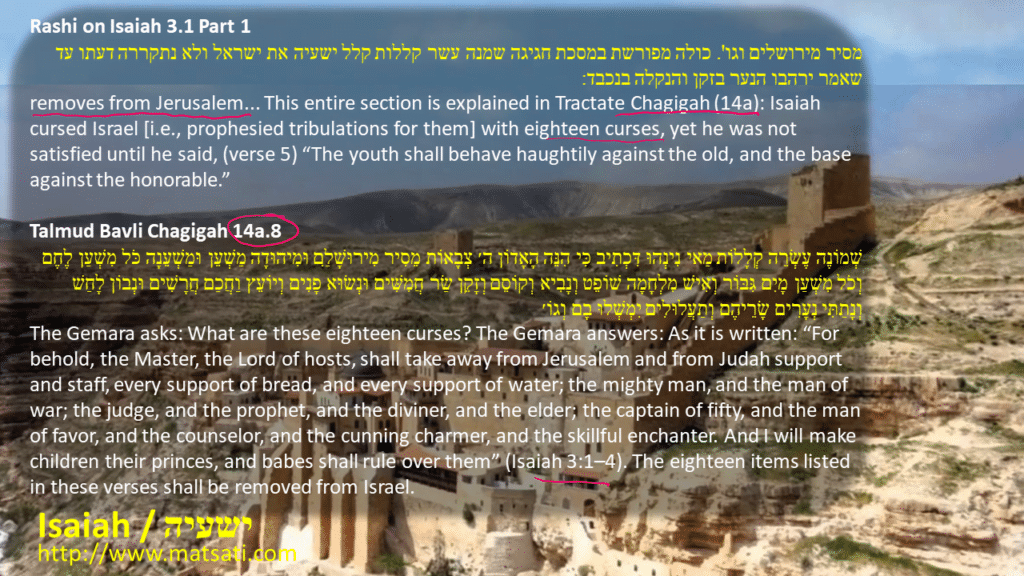
Rashi on Isaiah 3.1 Part 1
מסיר מירושלים וגו’. כולה מפורשת במסכת חגיגה שמנה עשר קללות קלל ישעיה את ישראל ולא נתקררה דעתו עד שאמר ירהבו הנער בזקן והנקלה בנכבד:
removes from Jerusalem… This entire section is explained in Tractate Chagigah (14a): Isaiah cursed Israel [i.e., prophesied tribulations for them] with eighteen curses, yet he was not satisfied until he said, (verse 5) “The youth shall behave haughtily against the old, and the base against the honorable.”
Here Rashi speaks of 18 curses that are listed in Isaiah 3:1-4. Isaiah foretells the downfall of Israel at Assyria’s hand, which we learn about in more detail according to 2 Kings 17. Isaiah also anticipates Judah’s fall, when he predicts that the Babylonians will carry the people away. We see this come true in 2 Chronicles 36 and Daniel 1:1-2. Would these things be considered a curse? The Rabbis of the Talmud describe these things in the following way.
Talmud Bavli Chagigah 14a.8
שְׁמוֹנֶה עֶשְׂרֵה קְלָלוֹת מַאי נִינְהוּ דִּכְתִיב כִּי הִנֵּה הָאָדוֹן ה׳ צְבָאוֹת מֵסִיר מִירוּשָׁלִַם וּמִיהוּדָה מַשְׁעֵן וּמַשְׁעֵנָה כֹּל מִשְׁעַן לֶחֶם וְכֹל מִשְׁעַן מָיִם גִּבּוֹר וְאִישׁ מִלְחָמָה שׁוֹפֵט וְנָבִיא וְקוֹסֵם וְזָקֵן שַׂר חֲמִשִּׁים וּנְשׂוּא פָנִים וְיוֹעֵץ וַחֲכַם חֲרָשִׁים וּנְבוֹן לָחַשׁ וְנָתַתִּי נְעָרִים שָׂרֵיהֶם וְתַעֲלוּלִים יִמְשְׁלוּ בָם וְגוֹ׳
The Gemara asks: What are these eighteen curses? The Gemara answers: As it is written: “For behold, the Master, the Lord of hosts, shall take away from Jerusalem and from Judah support and staff, every support of bread, and every support of water; the mighty man, and the man of war; the judge, and the prophet, and the diviner, and the elder; the captain of fifty, and the man of favor, and the counselor, and the cunning charmer, and the skillful enchanter. And I will make children their princes, and babes shall rule over them” (Isaiah 3:1–4). The eighteen items listed in these verses shall be removed from Israel.
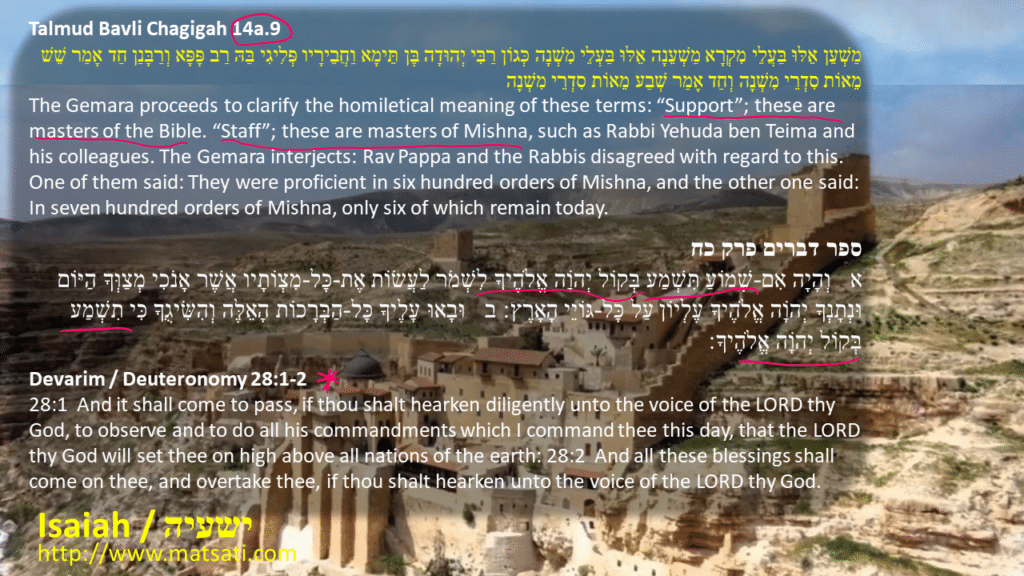
Talmud Bavli Chagigah 14a.9
מַשְׁעֵן אֵלּוּ בַּעֲלֵי מִקְרָא מַשְׁעֵנָה אֵלּוּ בַּעְלֵי מִשְׁנָה כְּגוֹן רַבִּי יְהוּדָה בֶּן תֵּימָא וַחֲבֵירָיו פְּלִיגִי בַּהּ רַב פָּפָּא וְרַבָּנַן חַד אָמַר שֵׁשׁ מֵאוֹת סִדְרֵי מִשְׁנָה וְחַד אָמַר שְׁבַע מֵאוֹת סִדְרֵי מִשְׁנָה
The Gemara proceeds to clarify the homiletical meaning of these terms: “Support”; these are masters of the Bible. “Staff”; these are masters of Mishna, such as Rabbi Yehuda ben Teima and his colleagues. The Gemara interjects: Rav Pappa and the Rabbis disagreed with regard to this. One of them said: They were proficient in six hundred orders of Mishna, and the other one said: In seven hundred orders of Mishna, only six of which remain today.
Even the Rabbis ask “what are these eighteen curses?” The curses are defined as (i) taking away the stay, and (ii) the staff, (iii) every support of bread, (iv) every support of water, (v) the mighty man, (vi) the man of war, (vii) the judge, (viii) the prophet, (ix) the diviner, (x) the elder, (xi) the captain of fifty, (xii) the man of favor, (xiii) the counselor, (xiv) the cunning charmer, (xv) the skillful enchanter. And will make (xvi) children their princes, and (xvii) babes will rule over them. Here the list numbers to be 17 as opposed to 18. Notice how the curse that is being described here is something that is being taken away from Israel. This reminds us of the blessings and the curses found in the Torah according to Devarim / Deuteronomy 28. The blessings come first and Moshe writes the opening passages to Devarim / Deuteronomy 28 in the following way.
ספר דברים פרק כח
א וְהָיָה אִם-שָׁמוֹעַ תִּשְׁמַע בְּקוֹל יְהוָֹה אֱלֹהֶיךָ לִשְׁמֹר לַעֲשֹוֹת אֶת-כָּל-מִצְוֹתָיו אֲשֶׁר אָנֹכִי מְצַוְּךָ הַיּוֹם וּנְתָנְךָ יְהוָֹה אֱלֹהֶיךָ עֶלְיוֹן עַל כָּל-גּוֹיֵי הָאָרֶץ: ב וּבָאוּ עָלֶיךָ כָּל-הַבְּרָכוֹת הָאֵלֶּה וְהִשִּׂיגֻךָ כִּי תִשְׁמַע בְּקוֹל יְהוָֹה אֱלֹהֶיךָ:
Devarim / Deuteronomy 28:1-2
28:1 And it shall come to pass, if thou shalt hearken diligently unto the voice of the LORD thy God, to observe and to do all his commandments which I command thee this day, that the LORD thy God will set thee on high above all nations of the earth: 28:2 And all these blessings shall come on thee, and overtake thee, if thou shalt hearken unto the voice of the LORD thy God.
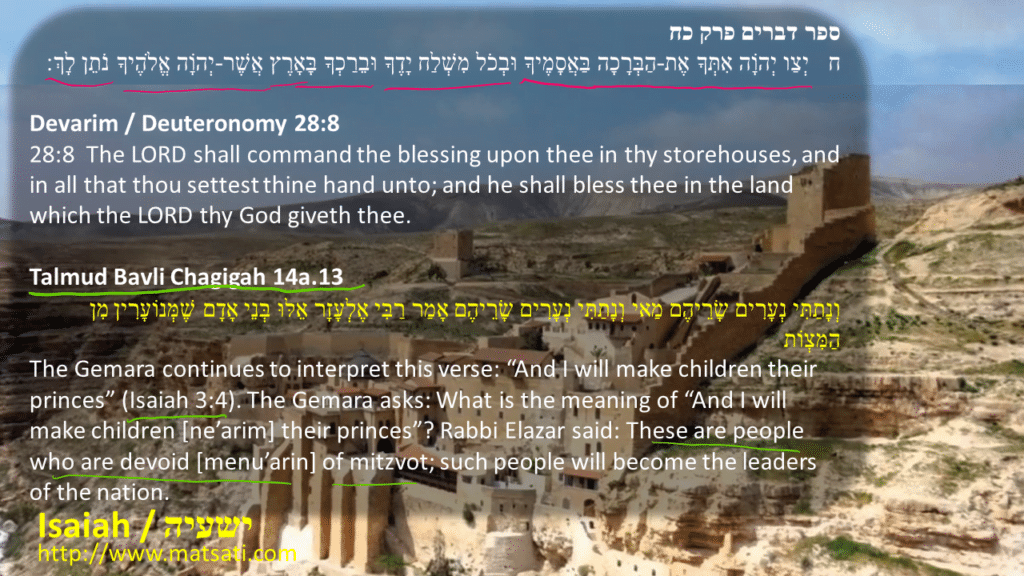
ספר דברים פרק כח
ח יְצַו יְהוָֹה אִתְּךָ אֶת-הַבְּרָכָה בַּאֲסָמֶיךָ וּבְכֹל מִשְׁלַח יָדֶךָ וּבֵרַכְךָ בָּאָרֶץ אֲשֶׁר-יְהוָֹה אֱלֹהֶיךָ נֹתֵן לָךְ:
Devarim / Deuteronomy 28:8
28:8 The LORD shall command the blessing upon thee in thy storehouses, and in all that thou settest thine hand unto; and he shall bless thee in the land which the LORD thy God giveth thee.
Note how the blessing of God comes when we seek the Lord God in heaven, His truth according to His words, and look to order our lives according to His Words by obeying His commands. כִּי תִשְׁמַע בְּקוֹל יְהוָֹה אֱלֹהֶיךָ “if you listen to the voice of your God” speaks to our desiring to walk before God in His ways! Do you have a desire to walk in the ways of God today? If we seek these things, we read יְצַו יְהוָֹה אִתְּךָ אֶת-הַבְּרָכָה בַּאֲסָמֶיךָ וּבְכֹל מִשְׁלַח יָדֶךָ וּבֵרַכְךָ בָּאָרֶץ אֲשֶׁר-יְהוָֹה אֱלֹהֶיךָ נֹתֵן לָךְ “The LORD shall command the blessing upon thee in thy storehouses, and in all that thou settest thine hand unto; and he shall bless thee in the land which the LORD thy God giveth thee.” This is the covenant that God is making with His people. We note something about the significance and the power of the covenant in which God is making with His people. Some insights may be drawn out from the narrative in the Torah, such as according to Bereshit / Genesis 6:18. וַהֲקִמֹתִ֥י אֶת־בְּרִיתִ֖י אִתָּ֑ךְ וּבָאתָ֙ אֶל־הַתֵּבָ֔ה אַתָּ֕ה וּבָנֶ֛יךָ וְאִשְׁתְּךָ֥ וּנְשֵֽׁי־בָנֶ֖יךָ אִתָּֽךְ׃ “But I will establish my covenant with you, and you shall come into the ark, you, your sons, your wife, and your sons’ wives with you.” Note how a covenant is necessary for this global event that is about to take place. Here God makes a covenant with Noah and his family, for the specific purpose of bringing them into the ark. This speaks to the significance and power of the covenant of God in the lives of His people. Within the covenant of God we have His protection over our lives. Doesn’t matter what happens, no matter how catastrophic, he will bring us through. This speaks to that. But what happens when one chooses to break that covenant through unrepentant sin? The Torah gives us a list of things to look for according to Devarim / Deuteronomy 28:15-68.
Devarim / Deuteronomy 28:15-68
28:15 But it shall come to pass, if thou wilt not hearken unto the voice of the LORD thy God, to observe to do all his commandments and his statutes which I command thee this day; that all these curses shall come upon thee, and overtake thee: 28:16 Cursed shalt thou be in the city, and cursed shalt thou be in the field. 28:17 Cursed shall be thy basket and thy store. 28:18 Cursed shall be the fruit of thy body, and the fruit of thy land, the increase of thy kine, and the flocks of thy sheep. 28:19 Cursed shalt thou be when thou comest in, and cursed shalt thou be when thou goest out. 28:20 The LORD shall send upon thee cursing, vexation, and rebuke, in all that thou settest thine hand unto for to do, until thou be destroyed, and until thou perish quickly; because of the wickedness of thy doings, whereby thou hast forsaken me. 28:21 The LORD shall make the pestilence cleave unto thee, until he have consumed thee from off the land, whither thou goest to possess it. 28:22 The LORD shall smite thee with a consumption, and with a fever, and with an inflammation, and with an extreme burning, and with the sword, and with blasting, and with mildew; and they shall pursue thee until thou perish. 28:23 And thy heaven that is over thy head shall be brass, and the earth that is under thee shall be iron. 28:24 The LORD shall make the rain of thy land powder and dust: from heaven shall it come down upon thee, until thou be destroyed. 28:25 The LORD shall cause thee to be smitten before thine enemies: thou shalt go out one way against them, and flee seven ways before them: and shalt be removed into all the kingdoms of the earth. 28:26 And thy carcase shall be meat unto all fowls of the air, and unto the beasts of the earth, and no man shall fray them away. 28:27 The LORD will smite thee with the botch of Egypt, and with the emerods, and with the scab, and with the itch, whereof thou canst not be healed. 28:28 The LORD shall smite thee with madness, and blindness, and astonishment of heart: 28:29 And thou shalt grope at noonday, as the blind gropeth in darkness, and thou shalt not prosper in thy ways: and thou shalt be only oppressed and spoiled evermore, and no man shall save thee. 28:30 Thou shalt betroth a wife, and another man shall lie with her: thou shalt build an house, and thou shalt not dwell therein: thou shalt plant a vineyard, and shalt not gather the grapes thereof. 28:31 Thine ox shall be slain before thine eyes, and thou shalt not eat thereof: thine ass shall be violently taken away from before thy face, and shall not be restored to thee: thy sheep shall be given unto thine enemies, and thou shalt have none to rescue them. 28:32 Thy sons and thy daughters shall be given unto another people, and thine eyes shall look, and fail with longing for them all the day long; and there shall be no might in thine hand. 28:33 The fruit of thy land, and all thy labours, shall a nation which thou knowest not eat up; and thou shalt be only oppressed and crushed alway: 28:34 So that thou shalt be mad for the sight of thine eyes which thou shalt see. 28:35 The LORD shall smite thee in the knees, and in the legs, with a sore botch that cannot be healed, from the sole of thy foot unto the top of thy head. 28:36 The LORD shall bring thee, and thy king which thou shalt set over thee, unto a nation which neither thou nor thy fathers have known; and there shalt thou serve other gods, wood and stone. 28:37 And thou shalt become an astonishment, a proverb, and a byword, among all nations whither the LORD shall lead thee. 28:38 Thou shalt carry much seed out into the field, and shalt gather but little in; for the locust shall consume it. 28:39 Thou shalt plant vineyards, and dress them, but shalt neither drink of the wine, nor gather the grapes; for the worms shall eat them. 28:40 Thou shalt have olive trees throughout all thy coasts, but thou shalt not anoint thyself with the oil; for thine olive shall cast his fruit. 28:41 Thou shalt beget sons and daughters, but thou shalt not enjoy them; for they shall go into captivity. 28:42 All thy trees and fruit of thy land shall the locust consume. 28:43 The stranger that is within thee shall get up above thee very high; and thou shalt come down very low. 28:44 He shall lend to thee, and thou shalt not lend to him: he shall be the head, and thou shalt be the tail. 28:45 Moreover all these curses shall come upon thee, and shall pursue thee, and overtake thee, till thou be destroyed; because thou hearkenedst not unto the voice of the LORD thy God, to keep his commandments and his statutes which he commanded thee: 28:46 And they shall be upon thee for a sign and for a wonder, and upon thy seed for ever. 28:47 Because thou servedst not the LORD thy God with joyfulness, and with gladness of heart, for the abundance of all things; 28:48 Therefore shalt thou serve thine enemies which the LORD shall send against thee, in hunger, and in thirst, and in nakedness, and in want of all things: and he shall put a yoke of iron upon thy neck, until he have destroyed thee. 28:49 The LORD shall bring a nation against thee from far, from the end of the earth, as swift as the eagle flieth; a nation whose tongue thou shalt not understand; 28:50 A nation of fierce countenance, which shall not regard the person of the old, nor shew favour to the young: 28:51 And he shall eat the fruit of thy cattle, and the fruit of thy land, until thou be destroyed: which also shall not leave thee either corn, wine, or oil, or the increase of thy kine, or flocks of thy sheep, until he have destroyed thee. 28:52 And he shall besiege thee in all thy gates, until thy high and fenced walls come down, wherein thou trustedst, throughout all thy land: and he shall besiege thee in all thy gates throughout all thy land, which the LORD thy God hath given thee. 28:53 And thou shalt eat the fruit of thine own body, the flesh of thy sons and of thy daughters, which the LORD thy God hath given thee, in the siege, and in the straitness, wherewith thine enemies shall distress thee: 28:54 So that the man that is tender among you, and very delicate, his eye shall be evil toward his brother, and toward the wife of his bosom, and toward the remnant of his children which he shall leave: 28:55 So that he will not give to any of them of the flesh of his children whom he shall eat: because he hath nothing left him in the siege, and in the straitness, wherewith thine enemies shall distress thee in all thy gates. 28:56 The tender and delicate woman among you, which would not adventure to set the sole of her foot upon the ground for delicateness and tenderness, her eye shall be evil toward the husband of her bosom, and toward her son, and toward her daughter, 28:57 And toward her young one that cometh out from between her feet, and toward her children which she shall bear: for she shall eat them for want of all things secretly in the siege and straitness, wherewith thine enemy shall distress thee in thy gates. 28:58 If thou wilt not observe to do all the words of this law that are written in this book, that thou mayest fear this glorious and fearful name, THE LORD THY GOD; 28:59 Then the LORD will make thy plagues wonderful, and the plagues of thy seed, even great plagues, and of long continuance, and sore sicknesses, and of long continuance. 28:60 Moreover he will bring upon thee all the diseases of Egypt, which thou wast afraid of; and they shall cleave unto thee. 28:61 Also every sickness, and every plague, which is not written in the book of this law, them will the LORD bring upon thee, until thou be destroyed. 28:62 And ye shall be left few in number, whereas ye were as the stars of heaven for multitude; because thou wouldest not obey the voice of the LORD thy God. 28:63 And it shall come to pass, that as the LORD rejoiced over you to do you good, and to multiply you; so the LORD will rejoice over you to destroy you, and to bring you to nought; and ye shall be plucked from off the land whither thou goest to possess it. 28:64 And the LORD shall scatter thee among all people, from the one end of the earth even unto the other; and there thou shalt serve other gods, which neither thou nor thy fathers have known, even wood and stone. 28:65 And among these nations shalt thou find no ease, neither shall the sole of thy foot have rest: but the LORD shall give thee there a trembling heart, and failing of eyes, and sorrow of mind: 28:66 And thy life shall hang in doubt before thee; and thou shalt fear day and night, and shalt have none assurance of thy life: 28:67 In the morning thou shalt say, Would God it were even! and at even thou shalt say, Would God it were morning! for the fear of thine heart wherewith thou shalt fear, and for the sight of thine eyes which thou shalt see. 28:68 And the LORD shall bring thee into Egypt again with ships, by the way whereof I spake unto thee, Thou shalt see it no more again: and there ye shall be sold unto your enemies for bondmen and bondwomen, and no man shall buy you. (KJV)
This is a significant list of things that happen as a result of unrepentant disobedience. Notice how these curses touch on each of the things listed here according to Isaiah 3, (i) taking away the stay, and (ii) the staff, (iii) every support of bread, (iv) every support of water, (v) the mighty man, (vi) the man of war, (vii) the judge, (viii) the prophet, (ix) the diviner, (x) the elder, (xi) the captain of fifty, (xii) the man of favor, (xiii) the counselor, (xiv) the cunning charmer, (xv) the skillful enchanter. And will make (xvi) children their princes, and (xvii) babes will rule over them. Note how the rabbis “clarify the homiletical meaning of these terms: ‘Support’ these are masters of the Bible, ‘Staff’ these are masters of Mishna.” Their conclusion is that if the people are not interested in studying God’s Word, then He will remove the teachers and leaders and give them what they want, an absence of hearing from the Lord and from knowing God’s word even. This section of the Torah is known as Parashat Ki Tavo. This section of the Torah, particularly the list of curses are seemingly endless as Moshe appears to go on and on. In Jewish tradition, these curses are known as תוֹכֵחָה (tochechah) which means “rebuke.” There are actually two locations for the תוֹכֵחָה in the Torah. The first is in Vayikra / Leviticus 26:14-46, and the second is here in Devarim / Deuteronomy 28:15-68 . The point of these things that Moshe is speaking about is in regards to obedience. Obedience is not meant as a way to justify our righteousness before God. In addition to this, these curses come upon those who are unrepentant and willfully disregarding God’s word, His call, and willfully living in sin without thought or will to admit their sin, and seek God to help them overcome their sins. These are significant points that are missing in all Christian theology / doctrines regarding “the curse of the law.” To have faith in Yeshua, we are free from the curse of the law. The issue is if one is living in unrepentant sin, meaning that we do not have faith and are not living faithfully before God, does the blood of Yeshua still protect us from the curse of the Torah? I know people who would say yes. The Apostle Paul draws out these points according to His epistles saying, “God made the One who did not know sin to be sin for us, so that we would become the righteousness of God (δικαιοσύνη θεοῦ) in Him” (2 Corinthians 5:21). Paul writes הַצְּדָקָה שֶׁל אֱלֹהִים “the righteousness of God” is what saves us, and not the righteousness that we may merit through obedience to the Torah (Titus 3:5-7). The point is that the Torah was not given for man to earn his salvation, or his own righteous standing before God. Yeshua delivered us from the curse of the Torah by becoming a curse on our behalf. (Devarim / Deuteronomy 21:23, Galatians 3:13) This was accomplished in heaven, as we are told Yeshua took his blood into the heavenly Tabernacle. (Hebrews 9:12 and 13:10) The major issue of first century Judaism was self justification before God. This was the difference that the Messiah makes in our lives, that by faith in Him we receive the Holy Spirit of God, and are empowered to not just obey God’s word, but having a desire to live our lives for the Lord to bring glory to God. This is what Paul speaks of as the “law of the Spirit” (Romans 8:2) that enables us to live for the Lord and escape the curse of the Torah listed here in Devarim / Deuteronomy 28. Note that all of these things come by the power and glory of God in our lives! It is only those who love the Messiah of God and His Salvation who can truly be Torah observant. So we ask ourselves again, what are the consequences of breaking the covenant of God by turning from Him, trusting in ourselves, and living in unrepentant sin?
Isaiah 3:2-4 go on saying the following, ב גִיבָר וּגבַר עָבֵיד קְרָב דַיָין וְסָפַר וּמִשתְאֵיל וְסָב׃ 3:2 The mighty man, and the man that maketh war, the judge, and the prophet, and the scribe, and the diviner, and the ancient, ג רַב חַמשִין וּנסִיב אַפִין וּמָלֵך מֵילַך וְאָמַר וּמִשתְמַע וְחַכִים וְסִיב וְסוּכלְתָן בְעֵיצָא׃ 3:3 The captain of fifty, and the honourable man, and the counsellor, and he that commands, and he that obeyeth, and the wise in counsel. ד וַאְמַנֵי יָנְקַיָא פַרנָסֵיהֹון וְחַלָשַיָא יִשלְטוּן בְהֹון׃ 3:4 And I will appoint sucklings to be their governors, and the weak shall rule over them. (TgJ)
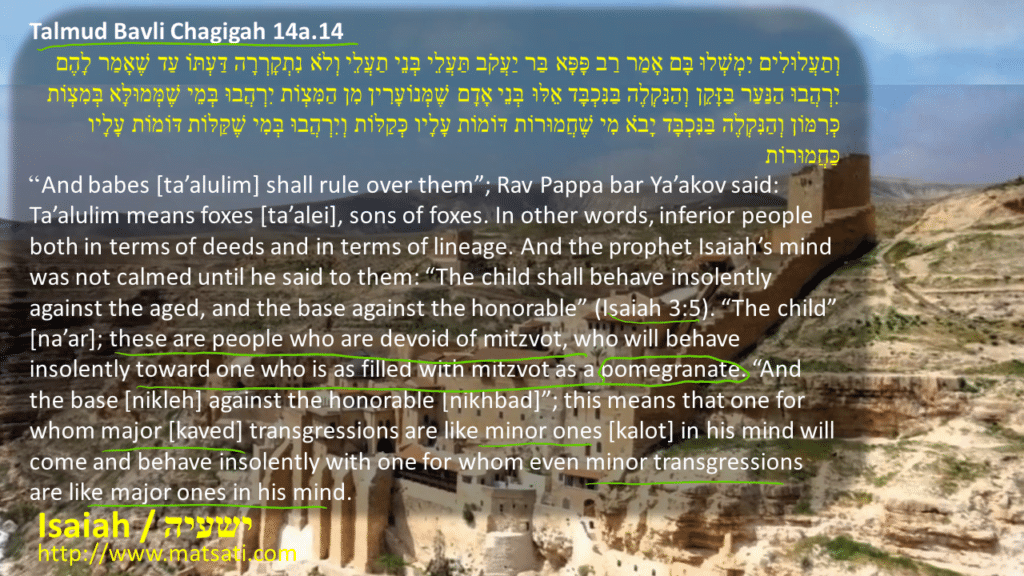
Talmud Bavli Chagigah 14a.13
וְנָתַתִּי נְעָרִים שָׂרֵיהֶם מַאי וְנָתַתִּי נְעָרִים שָׂרֵיהֶם אָמַר רַבִּי אֶלְעָזָר אֵלּוּ בְּנֵי אָדָם שֶׁמְּנוֹעָרִין מִן הַמִּצְוֹת
The Gemara continues to interpret this verse: “And I will make children their princes” (Isaiah 3:4). The Gemara asks: What is the meaning of “And I will make children [ne’arim] their princes”? Rabbi Elazar said: These are people who are devoid [menu’arin] of mitzvot; such people will become the leaders of the nation.
Talmud Bavli Chagigah 14a.14
וְתַעֲלוּלִים יִמְשְׁלוּ בָּם אָמַר רַב פָּפָּא בַּר יַעֲקֹב תַּעֲלֵי בְּנֵי תַעֲלֵי וְלֹא נִתְקָרְרָה דַּעְתּוֹ עַד שֶׁאָמַר לָהֶם יִרְהֲבוּ הַנַּעַר בַּזָּקֵן וְהַנִּקְלֶה בַּנִּכְבָּד אֵלּוּ בְּנֵי אָדָם שֶׁמְּנוֹעָרִין מִן הַמִּצְוֹת יִרְהֲבוּ בְּמֵי שֶׁמְּמוּלָּא בְּמִצְוֹת כְּרִמּוֹן וְהַנִּקְלֶה בַּנִּכְבָּד יָבֹא מִי שֶׁחֲמוּרוֹת דּוֹמוֹת עָלָיו כְּקַלּוֹת וְיִרְהֲבוּ בְּמִי שֶׁקַּלּוֹת דּוֹמוֹת עָלָיו כַּחֲמוּרוֹת
“And babes [ta’alulim] shall rule over them”; Rav Pappa bar Ya’akov said: Ta’alulim means foxes [ta’alei], sons of foxes. In other words, inferior people both in terms of deeds and in terms of lineage. And the prophet Isaiah’s mind was not calmed until he said to them: “The child shall behave insolently against the aged, and the base against the honorable” (Isaiah 3:5). “The child” [na’ar]; these are people who are devoid of mitzvot, who will behave insolently toward one who is as filled with mitzvot as a pomegranate. “And the base [nikleh] against the honorable [nikhbad]”; this means that one for whom major [kaved] transgressions are like minor ones [kalot] in his mind will come and behave insolently with one for whom even minor transgressions are like major ones in his mind.
The rabbis speak of those who are children ruling over the people as those who do not obey God’s commands. The mitzvot (commands) of God embody truth, righteousness, holiness, and justice. When we consider this interpretation and look at our present time and leadership in government at the local, the state, and the national levels, this appears to be true, such people are those who become the leaders and rulers over the people. The major concept that is being drawn out here is from the sense of when the people turn from the Lord, then God will give their leadership to those who are corrupt who behave as children in ways that are wanton and fleshly, not as one who is disciplined and with self-restrained. Isn’t this what we are seeing taking place around the world? The Lord God Almighty is speaking to us through these evil leaderships that are over the populations of the world today. He is speaking to us in regards to coming out from the world, to seek His ways, to believe in His Messiah, and to receive His Spirit, His presence, His Shekhinah in our hearts and our lives so that we can shine forth his truth, light, righteousness, and holiness in a dark, dying, and hopeless world! There is a lot of truth here if we are willing to take time to draw near to the Lord God in heaven in His Holy Word!
Isaiah goes on according to the Targum saying, ה וְיִתגָרוּן עַמָא גְבַר בִגבַר וּגבַר בְחַברֵיה יִשלְטוּן עוּלֵימָא בְסָבָא וּדשִיט בִדיַקִיר׃ 3:5 The nations shall wage war, man against man, and a man against his neighbour; children shall rule over the ancient, and the base over the honourable. ו אְרֵי יֵיחֹוד גְבַר בַאְחוּהִי מִזַרעִית בֵית אְבוּהִי לְמֵימַר כְסוּ אִית לָך רָב תְהֵי עְלַנָא וּמַגבִיתָא הָדָא תְהֵי תְחֹות יְדָך׃ 3:6 For a man shall take hold of his brother, of the family of his father’s house, saying, Thou hast clothing, be thou a ruler over us, and this ruin shall be under thy government. ז יָתִיב בְעִידָנָא הַהוּא לְמֵימַר לֵית אְנָא כָשַר לְמִהוֵי רֵיש וּבבֵיתִי לֵית מָא דאֵיכֹול וְלֵית מָא דְאַתכַסֵי לָא תְמַנֹונַנִי רָב עַל עַמָא׃ 3:7 He shall answer in that time, saying, I am not a proper person to become a chief, and in my house I have nothing that I could eat, and nothing wherewith I could clothe myself; appoint me not a chief over all this people. (TgJ) The idea that Jonathan is suggesting is that the people are desperate to blame someone, and so they will go to their own brother, to the family of their fathers house, and try and make him a ruler saying “and this ruin shall be under thy government.” Rashi interprets this saying the following:
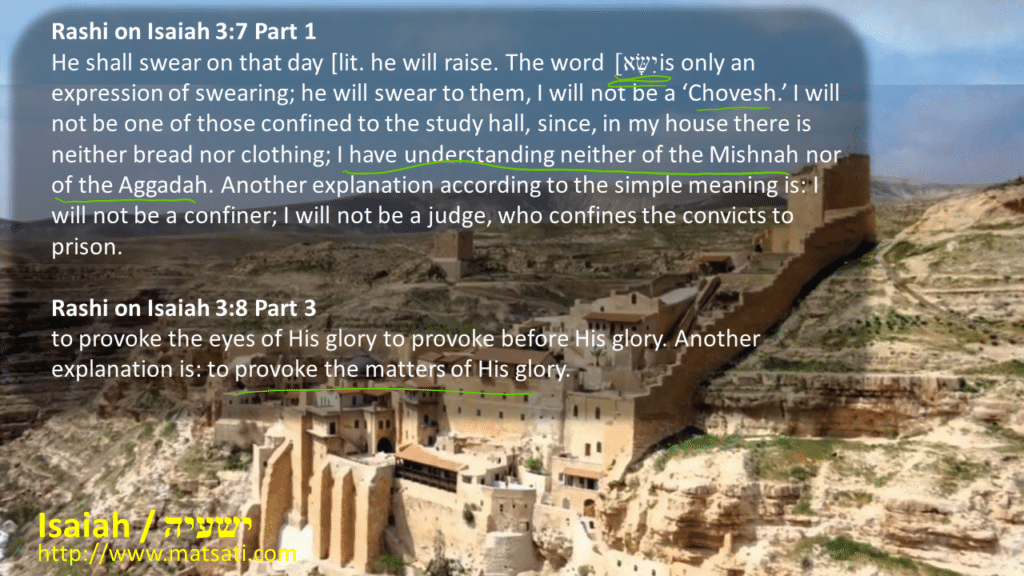
Rashi on Isaiah 3:7 Part 1
He shall swear on that day [lit. he will raise. The word יִשָּׂא] is only an expression of swearing; he will swear to them, I will not be a ‘Chovesh.’ I will not be one of those confined to the study hall, since, in my house there is neither bread nor clothing; I have understanding neither of the Mishnah nor of the Aggadah. Another explanation according to the simple meaning is: I will not be a confiner; I will not be a judge, who confines the convicts to prison.
Rashi speaks again to the study of the Torah, and that a leader is to be involved in studying God’s word very closely such that through doing so he will be equipped and able to lead the people. Rashi says that this type of person will refuse to be a כובש (Chovesh), one who has conquered all. This is the description of a true leader, one who can inspire, promote, enhance and protect those around him/her. Inspire by making him/herself an example to follow (shirt tucked in, cleans up around the office, etc). One who is able to promote and encourage his/her team, giving constructive criticism, etc. The ungodly, the wicked refuse to be such a person. As God’s people we are called to shine forth the light that God has given us, and so we are to be influencers as the chovesh. Yeshua the Messiah is the ultimate chovesh who laid his life down for ours and led by example! Isaiah continues saying, ח אְרֵי אִתְקִילוּ יָתְבֵי יְרוּשְלַם וַאְנָש יְהוּדָה גְלֹו אְרֵי מַמלַל פוּמְהֹון וַאְגַר עוּבָדֵיהֹון גְלַן קֳדָם יוי מַרגְזִין קֳדָם יְקָרֵיה׃ 3:8 Because the inhabitants of Jerusalem have stumbled, therefore the men of Judah shall go into captivity; surely the speech of their mouth and the wages of their works are revealed before the Lord, and they have provoked to anger His glory. (TgJ)
Rashi on Isaiah 3:8 Part 3
to provoke the eyes of His glory to provoke before His glory. Another explanation is: to provoke the matters of His glory.
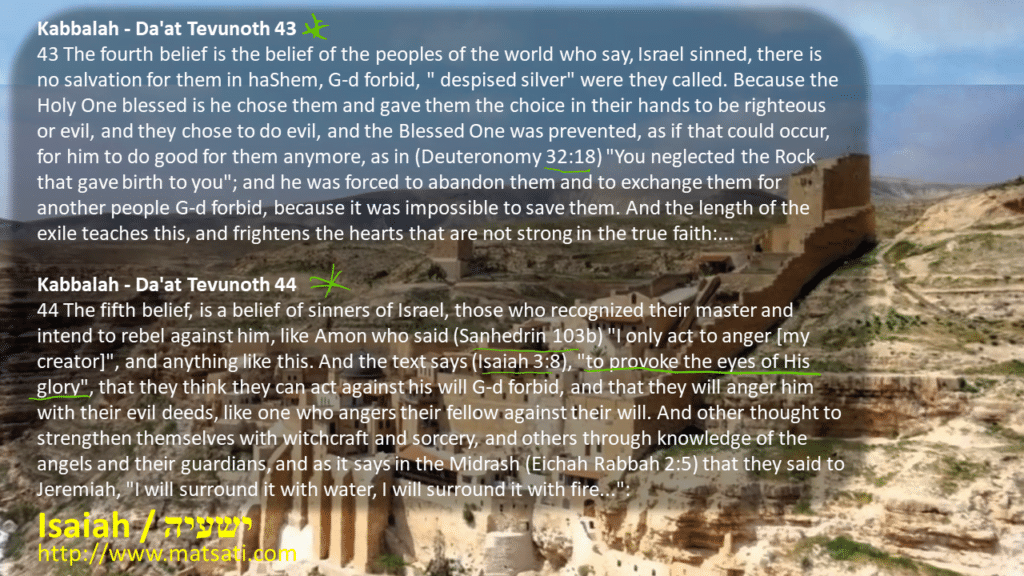
Kabbalah – Da’at Tevunoth 43
43 The fourth belief is the belief of the peoples of the world who say, Israel sinned, there is no salvation for them in haShem, G-d forbid, ” despised silver” were they called. Because the Holy One blessed is he chose them and gave them the choice in their hands to be righteous or evil, and they chose to do evil, and the Blessed One was prevented, as if that could occur, for him to do good for them anymore, as in (Deuteronomy 32:18) “You neglected the Rock that gave birth to you”; and he was forced to abandon them and to exchange them for another people G-d forbid, because it was impossible to save them. And the length of the exile teaches this, and frightens the hearts that are not strong in the true faith:…
Kabbalah – Da’at Tevunoth 44
44 The fifth belief, is a belief of sinners of Israel, those who recognized their master and intend to rebel against him, like Amon who said (Sanhedrin 103b) “I only act to anger [my creator]”, and anything like this. And the text says (Isaiah 3:8), “to provoke the eyes of His glory”, that they think they can act against his will G-d forbid, and that they will anger him with their evil deeds, like one who angers their fellow against their will. And other thought to strengthen themselves with witchcraft and sorcery, and others through knowledge of the angels and their guardians, and as it says in the Midrash (Eichah Rabbah 2:5) that they said to Jeremiah, “I will surround it with water, I will surround it with fire…”:
Rashi speaks concerning the people provoking the glory of God. This is derived from a Torah centric principle, of the Lord God dwelling in the midst of His people, and His glory being present. The natural conclusion is that when one sins, God’s glory cannot be present. Da’at Tevunoth 43 speaks of when one rejects the foundation stone, the Rock, a reference to God Himself, when one rejects the Lord, there is the chance that one could be replaced by another. The idea here is that it is by the mercy and grace of God that we are able to have a relationship with God in heaven. Part 44 describes the one who lives in sin does so only to anger the Creator. Their evil deeds are characterized as witchcraft and sorcery, of the knowledge of angels and their guardians, which describes a form of rebellion that seeks to control one’s own destiny by one’s own means and the control of spirits, as opposed to trusting in the Lord. The sin of rebellion. Note that 1 Samuel 15:23 states “For rebellion is as the sin of witchcraft, And stubbornness is as iniquity and idolatry. Because you have rejected the word of the LORD, He also has rejected you from being king.” In 1 Samuel we see the direct correlation to rebellion that is in the form of rejecting the Lord and His Word, and analogizes this as one who practices witchcraft and idolatry.
Isaiah continues saying according to TgJ, ט אִשתְמֹודְעוּת אַפֵיהֹון בְדִינָא אַסהֵיד בְהֹון וּחָטאֵיהֹון כִסדֹומָאֵי קָבְלִין לָא מָנְעִין וָי לְנַפשְהֹון אְרֵי גְרַמוּ דְתֵיתֵי לְהֹון בִשתָא׃ 3:9 The shew of their faces in judgment bears testimony against them, and they declare their sins as the Sodomites, and they restrain not. Woe unto them! for they have caused that evil should come upon them. (TgJ) The Targum takes these rabbinic conclusions to describe the people’s sin as Sodom. Ibn Ezra and Rasi describe this in the following way:
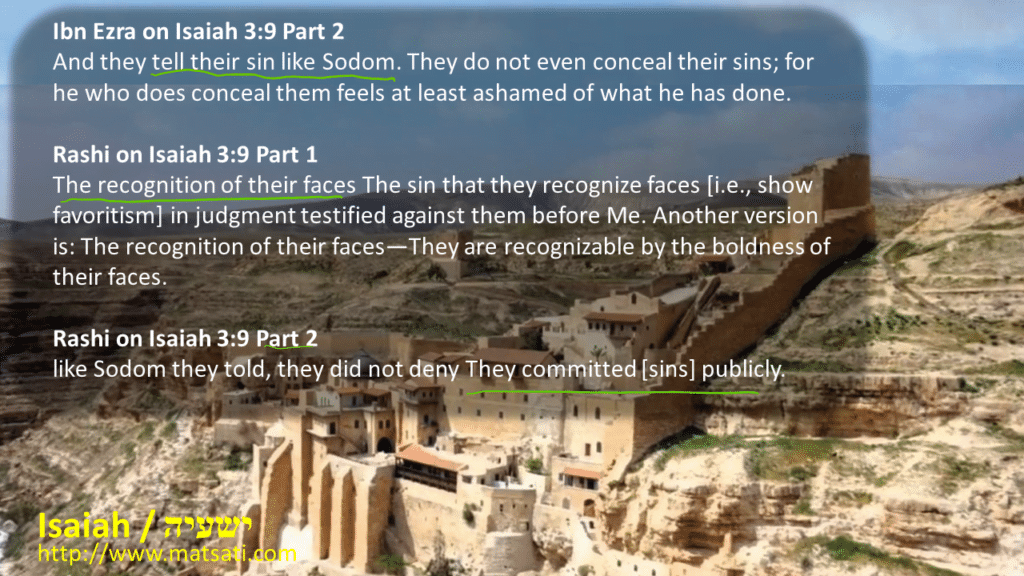
Ibn Ezra on Isaiah 3:9 Part 2
And they tell their sin like Sodom. They do not even conceal their sins; for he who does conceal them feels at least ashamed of what he has done.
Rashi on Isaiah 3:9 Part 1
The recognition of their faces The sin that they recognize faces [i.e., show favoritism] in judgment testified against them before Me. Another version is: The recognition of their faces—They are recognizable by the boldness of their faces.
Rashi on Isaiah 3:9 Part 2
like Sodom they told, they did not deny They committed [sins] publicly.
The idea here is exactly what we read in Isaiah 3:9 which states “The look on their faces testifies against them.” Their faces will testify to their depravity! This again is consistent with our present time. Notice how the mention of Sodom draws in the context of the LGBTQ community in today’s world. Notice the expression on the faces of transvestites when they prance around in their cross-dressing cloths. Similar to those who “exchanged the natural use for what is against nature” and who are proud of this behavior. This is what Isaiah is speaking of here in 3:9 “The look on their faces testifies against them.” The Lord God Almighty calls men, women, and children to come out of this lifestyle, to seek Him and His ways as opposed to the ways of Sodom, and the nations. Because there is great difficulty in a man to change his ways, we all need the Lord God Almighty to help change the sinful habits and rebellious ways. This is why our Father in heaven sent His son Yeshua to lay His life down on our behalf. It is in this way that we are able to acquire the Torah centric principle of God dwelling in our midst, by the faith that we have in Yeshua, we receive the Holy Spirit of God into our lives, to sanctify us on the inside, which then works it ways outward to be displayed in the way that we live.
The Targum continues translating Isaiah saying, י אֵימַרוּ לְצַדִיקַיָא טוּבֵיכֹון אְרֵי פֵירֵי עוּבָדֵיהֹון יִשתַלְמוּן׃ 3:10 Say ye to the righteous, that it shall be well with you, for the fruits of their work shall be recompensed. יא וָי לְרַשִיעַיָא דְעֹובָדֵיהֹון בִישִין אְרֵי גִמלָא דִידֵיהֹון יִתָתַב לְהֹון׃ 3:11 Woe to the wicked, whose works are evil; because the reward of their hands shall be returned to them. יב עַמִי דְסָרְכֹוהִי בְזָזוּהִי כִמעָלְלֵי כַרמָא וּכמָרֵי חֹובָא שְלִיטוּ בֵיה עַמִי מְשַבְחָך אַטעְיוּך וְאֹורַח שְבִילָך קַלקִילוּ׃ 3:12 As for my people, their oppressors plunder them, as those who glean the vineyard; and as usurers they rule over them. O my people, those that call thee blessed cause thee to err; and the way of thy path they have perverted. יג עְתִיד לִמדָן יוי וּמִתגְלֵי לְמַעְבַד פֹורעָנוּת דִין מִן עַמְמַיָא׃ 3:13 The Lord is ready to judge, and to reveal Himself to take vengeance of judgment of the nations. (TgJ) Notice how the Scriptures always draw us back to this concept of the fruit of our hands, a reference back to the Garden of Eden, with the fruit of the tree in the hand of Adam and Eve, and the willful choice of disobedience. The Talmud and Rashi state the following:
Talmud Bavli Bava Batra 11a:4
My ancestors stored up something that does not generate profit, as money sitting in a treasury does not increase, whereas I am storing up something that generates profit, as it is stated: “Say of the righteous, that it shall be well with them, for they shall eat the fruit of their doings” (Isaiah 3:10). My ancestors stored up treasures of money, whereas I am storing up treasures of souls, as it is stated: “The fruit of the righteous is a tree of life, and he that wins souls is wise” (Proverbs 11:30). My ancestors stored up for others, for their sons and heirs, when they themselves would pass from this world, whereas I am storing up for myself, as it is stated: “And it shall be as righteousness to you” (Deuteronomy 24:13). My ancestors stored up for this world, whereas I am storing up for the World-to-Come, as it is stated: “And your righteousness shall go before you, the glory of the Lord shall be your rearguard” (Isaiah 58:8).
Rashi on Isaiah 3:13 Part 1
stands to plead [i.e., to judge the case] of Israel standing, so to speak, so as not to be strict in their judgment.
Rashi on Isaiah 3:13 Part 2
and stands to judge the nations Heb. ועמד. He delays and dwells on their judgment. This expression of standing means delay.
Notice the rabbinic interpretation of storing up treasure in heaven. Yeshua also said according to Matthew 6:19 Lay not up for yourselves treasures upon earth, where moth and rust doth corrupt, and where thieves break through and steal: 6:20 But lay up for yourselves treasures in heaven, where neither moth nor rust doth corrupt, and where thieves do not break through nor steal: 6:21 For where your treasure is, there will your heart be also. (KJV) Yeshua speaks of storing up treasure in heaven, and the NT Scriptures provide us with many ways that one can store up “treasures in heaven.” (i) Remaining faithful enduring persecution (Matthew 5:11-12, 2 Corinthians 4:16-18, 2 Timothy 4:8), (ii) Loving your enemies (Matthew 5:43-48), (iii) Praying in secret (Matthew 6:5-6), (iv) Serving the Lord and his people (Matthew 10:41-42, 1 Corinthians 3:8, Hebrews 6:10). These things all speak to humbling our hearts to take upon ourselves a servant attitude. Notice how this draws us back to being like children in matters of faith in relation to innocence and perfection, not seeking from a selfish desire. The Rabbis say in the Talmud Bavli Bava Batra 11a, that one can store up treasures by winning souls. This speaks to presenting the truth of God’s Word to those who do not know God, His Word, and His Messiah. Believing upon Yeshua and receiving the Spirit of God in our lives, we are empowered to overcome this world!
